DOWNLOAD NEWS 2013/8
by Brian Wilson
See the Download News archive here.
I have to apologise for a longer than usual gap in
producing this edition and its predecessor, 2013/7 - here
- largely occasioned by problems with my PC and the new model which
I bought to replace it – no sooner had I got the hang of using
Windows 8 than everything had to be uninstalled and reinstalled. As
a result this DL News is late and over-laden even though I’ve gathered
together a number of recent Beulah albums in a separate DL News to celebrate
their forthcoming 20th birthday.
Carlo GESUALDO, Prince of Venosa (c.1561-1613)
Fifth and Sixth Books of Madrigals (1611)
Delitiæ Musicæ/Marco Longhini – rec.2010 and 2011.
DDD.
Pdf booklet with texts and translations included
NAXOS 8.573147-9 [3 CDs: 3:02:41] – from classicsonline.com
(mp3 and lossless) or stream from Naxos Music Library
Fifth Book of Madrigals (1611)
La Venexiana
GLOSSA GCD920935 [64:10] – from classicsonline.com
(mp3) or stream from Naxos Music Library
Sixth Book of Madrigals (1611)
Il Complesso Barocco/Alan Curtis – rec.1994. DDD.
PAN CLASSICS PC10229 [70:50] – from eclassical.com
(mp3 and lossless) or stream from Naxos Music Library (with booklet)
La Compagnia del Madrigale – rec. June/July 2012. DDD.
Pdf booklet with texts included
GLOSSA GCD922801 [77:42] – from classicsonline.com
(mp3) or stream from Naxos Music Library
O Dolorosa Gioa – Madrigals
Philippe De MONTE Di mie dogliose note [3:47]
Pomponio NENNA Occhi miei che vedeste giov’ an [4:14]
Giovanni MONTELLA Se lontana voi sete [2:04]
Carlo GESUALDO Moro, lasso, al mio duolo [4:05]
Se la mia morte brami [4:21]
Beltà poiche t’ assenti [4:32]
Canzone del Principe [6:05]
Gioite voi col canto [3:44]
Se non miro non moro [3:34]
Se vi duol il mio duolo [3:58]
Asciugate i begli occhi [4:28]
Mercè grido piangendo [5:05]
Lasguisce al fin [4:52]
Tu m’uccidi, o crudele [3:40]
Luzzasco LUZZASCHI Ahi cruda sorte mia [3:33]
Lungi da te cor mio [3:24]
Itene mie querele [1:43]
Maria Galassi (harp), Andrea Damiani (theorbo)
Concerto Italiano/Rinaldo Alessandrini – rec. c.1999. DDD.
NAÏVE OPUS111 OP30486 [67:10] – from eclassical.com
(mp3 and lossless) or stream from Naxos Music Library (no booklet from
either).
Gesualdo is famous – notorious even – for having killed his
wife and her lover and it’s popularly supposed that his music is
so intense because of his guilt at that deed. If that’s so, the
Borgias did a pretty good job of hiding their guilt, but it is true
that his sacred and secular music is darker than that of his contemporary
Monteverdi. If your idea of a madrigal is the English variety such as
It was a lover and his lass or Now is the month of Maying,
Gesualdo will be quite a shock to your system. The question at issue
in these recordings of his final two books of madrigals is how slow
and how intense the music should be and there’s quite a range to
choose among.
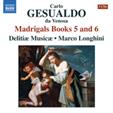 Naxos:
this is the final volume of the series. Longhini’s earlier volumes,
like his recordings of Monteverdi, have met with a mixed response from
myself and other MusicWeb reviewers. Both the style of performance,
with an all-male cast and counter-tenors on the top line, and the almost
universally slow tempi take some getting used to, so I suggest that
you try it out from Naxos Music Library if you can; otherwise listen
to some of the short snippets which Naxos include on their web page.
Naxos:
this is the final volume of the series. Longhini’s earlier volumes,
like his recordings of Monteverdi, have met with a mixed response from
myself and other MusicWeb reviewers. Both the style of performance,
with an all-male cast and counter-tenors on the top line, and the almost
universally slow tempi take some getting used to, so I suggest that
you try it out from Naxos Music Library if you can; otherwise listen
to some of the short snippets which Naxos include on their web page.
I reviewed Books 1 and 3 in this series in my June 2011/2 Download
Roundup and, as then, my response to their latest release remains
generally favourable but with reservations about the balance with an
all-male ensemble and the often very slow tempi adopted. On this occasion
I think these work but try some of the madrigals first along with the
other recordings that I’ve listed via Naxos Music Library. Taking
just the first two madrigals from Book 6 at random, Alan Curtis is fastest,
la Venexiana and Alessandrini occupy the middle ground and Longhini
is very much slower than any of the competition, hence the need to run
to three CDs. Book Five fares rather better but the opening two madrigals
take 4:19 and 4:18 respectively against 3:11 and 3:08 from la Venexiana,
3:44 and 3:34 from Alan Curtis, so the difference is still quite marked.
The mp3 sound is much more than acceptable – the lossless version
was not yet available when I obtained my review download. Naxos’s
lossless versions come in one long file with no separate tracks; there’s
another lossless version from eclassical.com, but that comes without
the booklet of notes and texts.
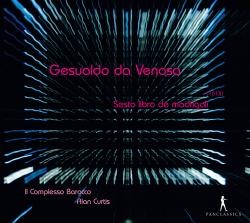 Pan
Classics: Il Complesso Barocco are a group with an excellent track
record in baroque music for various labels – I’m currently
looking forward to having enough spare time to listen to their latest
recording for Virgin Classics, Handel’s Giove in Argo (72311622).
Their recording of Book Six makes a more secure recommendation for me
than the Naxos. Their DVD recording of music by Gesualdo didn’t
get much of a recommendation from Tim Perry, who advised leaving it
well alone – review
– but that was more because of Werner Herzog’s film than the
performances. On Pan Classics they deliver impassioned performances
of this very emotive music, so I can think of no good reason why the
recording was not released until 2011 when it was recorded in 1994.
Tempi are generally the fastest on offer here without ever sounding
peremptory.
Pan
Classics: Il Complesso Barocco are a group with an excellent track
record in baroque music for various labels – I’m currently
looking forward to having enough spare time to listen to their latest
recording for Virgin Classics, Handel’s Giove in Argo (72311622).
Their recording of Book Six makes a more secure recommendation for me
than the Naxos. Their DVD recording of music by Gesualdo didn’t
get much of a recommendation from Tim Perry, who advised leaving it
well alone – review
– but that was more because of Werner Herzog’s film than the
performances. On Pan Classics they deliver impassioned performances
of this very emotive music, so I can think of no good reason why the
recording was not released until 2011 when it was recorded in 1994.
Tempi are generally the fastest on offer here without ever sounding
peremptory.
From eclassical.com it comes in mp3 and very good lossless sound but
there’s no book of words. Classicsonline.com have the book but
offer mp3 only. The way to square that circle is to purchase the download
from eclassical.com and download the booklet from Naxos Music Library.
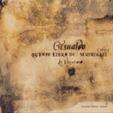
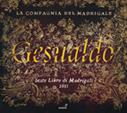 The
two Glossa recordings would probably be my desert-island compromise,
by which I don’t mean to imply that the performances are in any
way middling. La Venexiana are a distinguished and established ensemble
whose work I’ve praised before and I enjoyed their singing in Book
5. I hadn’t encountered la Compagnia del madrigale before but they
also acquit themselves very well in Book 6. As I was converting this
review for the web, I note that Johan van Veen has also enjoyed this
recording of Book 6 and made it a Recording of the Month.
The
two Glossa recordings would probably be my desert-island compromise,
by which I don’t mean to imply that the performances are in any
way middling. La Venexiana are a distinguished and established ensemble
whose work I’ve praised before and I enjoyed their singing in Book
5. I hadn’t encountered la Compagnia del madrigale before but they
also acquit themselves very well in Book 6. As I was converting this
review for the web, I note that Johan van Veen has also enjoyed this
recording of Book 6 and made it a Recording of the Month.
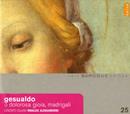 Concerto
Italiano: if you’re not willing to invest in the 3-CD Naxos
or the Pan Classics CD of Book 6, this selection, mainly drawn from
Books 5 and 6, together with madrigals by some of Gesualdo’s influences
and contemporaries, may be just what you are looking for. Even if you
intend to buy one of the other recordings, you may be interested in
hearing this recording which places Gesualdo in context.
Concerto
Italiano: if you’re not willing to invest in the 3-CD Naxos
or the Pan Classics CD of Book 6, this selection, mainly drawn from
Books 5 and 6, together with madrigals by some of Gesualdo’s influences
and contemporaries, may be just what you are looking for. Even if you
intend to buy one of the other recordings, you may be interested in
hearing this recording which places Gesualdo in context.
There are also recordings of Books Five and Six on the Globe label which
I haven’t been able to hear, but were well liked by Gary Higginson
– review.
For the recent first recording of Gesualdo’s Sacræ Cantiones,
Book II (Vocalconsort, Berlin, Harmonia Mundi HMC902123) see
2013/4 Download
News. The eclassical.com
download of this now comes with the pdf booklet with texts and translations,
the lack of which I bemoaned.
Discovery of the Month
Bartłomiej Pękiel (c.1610-c.1670)
Missa a14 (Kyrie and Gloria) [3:20 + 3:48]
Resonet in laudibus [1:49]
Dulcis amor Jesu [6:28]
Magnum nomen Domini [1:49]
Audite morales [12:55]
O Adoranda Trinitas [2:55]
Nativitas tua [4:06]
Missa Concertata (La Lombardesca) (Kyrie and Gloria)
[3:10 + 5:01]
Assumpta est Maria [2:42]
Missa Concertata (La Lombardesca) (Credo) [9:23]
Ave Maria [3:21]
Missa Concertata (La Lombardesca) (Sanctus, Benedictus
and Agnus Dei) [1:36 + 1:35 + 1:51]
The Sixteen/Eamonn Dougan
Pdf booklet with texts and translations included
CORO COR16110 [65:59] – from thesixteendigital.com
(mp3, aac, lossless flac and alac)
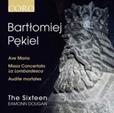 There
are two discoveries here – the music of Pękiel, otherwise
very sparsely represented in the catalogue, and the debut of associate
director Eamonn Dougan in his first complete solo flight in the hot
seat. Both are well worth your acquaintance.
There
are two discoveries here – the music of Pękiel, otherwise
very sparsely represented in the catalogue, and the debut of associate
director Eamonn Dougan in his first complete solo flight in the hot
seat. Both are well worth your acquaintance.
The ghost of Monteverdi is hovering in the background of the music but
it’s well worth hearing in its own right. There are no neglected
masterpieces here, but there are no ineffective or over-imitative works
either, and the performances, recording and booklet all do the music
justice.
The recording comes in a variety of formats and prices, two lossy (mp3
and Apple’s aac at £7.99) and two lossless (flac and Apple
alac at a rather pricey £16.50). It’s possible to purchase
a passport for all formats for £19.50, which is well worth considering
if you intend both to listen in 24/96 lossless and on an mp3 player
or burn to CDR – the lack of an intermediate 16/44.1 flac version
means that it’s impossible to burn the flac files to CDR –
they are too large for that. Unless you can burn and play DVD/A, then,
you’ll be limited to mp3 on disc.
Antonio VIVALDI (1678-1741)
Dixit Dominus, RV807 [26:44]
In furore iustissimae irae, RV626* [14:07]
George Frideric HANDEL (1685-1759)
Dixit Dominus, HWV232 [34:01]
Lucy Crowe (soprano)*
La Nuova Musica (Anna Dennis, Helen-Jane Howells, Augusta Hebbert, Esther
Brazil (sopranos); Christopher Lowrey (counter[-tenor); Simon Wall,
Tom Raskin (tenors) James Arthur (bass))/David Bates
Pdf booklet with texts and translations included.
HARMONIA MUNDI HMU807857 (35683115) [74:52] – from eclassical.com
(mp3, 16– and 24-bit lossless)
George Frideric HANDEL Gloria in excelsis Deo [16:05]
Emma Kirkby (soprano)
Royal Academy of Music Baroque Orchestra/Laurence Cummings – rec.
2001. DDD
Dixit Dominus, HWV232 [31:31]
Hillevi Martinpelto (soprano), Anne Sofie Von Otter (alto)
Stockholm Bach Choir, Drottingholm Baroque Ensemble/Anders Öhrwall
– rec. 1985. DDD
Pdf booklet with texts and translations included
BIS-CD-1235 [47:36] – from eclassical.com
(mp3 and lossless) or stream from Naxos Music Library
[see reviews
by Kirk McElhearn and Peter Woolf]
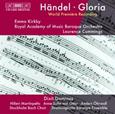 There
have been other recordings of the Handel Gloria but the BIS
version can claim primacy, having been recorded soon after the work
was discovered and almost universally accepted as the work of the young
composer, in 2000. Having recorded the new work, BIS had to look around
for something with which to couple it and decided that the Dixit
Dominus of several years earlier would do well. In the event there
is something of a mismatch, not least in terms of recording quality:
the Gloria still sounds fresh and clear but Dixit Dominus
is slightly distantly recorded. For all the quality of the performance,
too, there’s a clear contrast between the soprano and Emma Kirkby.
There
have been other recordings of the Handel Gloria but the BIS
version can claim primacy, having been recorded soon after the work
was discovered and almost universally accepted as the work of the young
composer, in 2000. Having recorded the new work, BIS had to look around
for something with which to couple it and decided that the Dixit
Dominus of several years earlier would do well. In the event there
is something of a mismatch, not least in terms of recording quality:
the Gloria still sounds fresh and clear but Dixit Dominus
is slightly distantly recorded. For all the quality of the performance,
too, there’s a clear contrast between the soprano and Emma Kirkby.
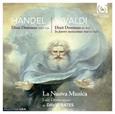 With
Emma Kirkby’s second thoughts on the Gloria, recorded with
London Baroque, also available from BIS, with the Nine German Arias
(BIS-CD-1615), the new Harmonia Mundi would seem to offer
a better prospect, especially if you don’t have a recording of
the two Vivaldi works.
With
Emma Kirkby’s second thoughts on the Gloria, recorded with
London Baroque, also available from BIS, with the Nine German Arias
(BIS-CD-1615), the new Harmonia Mundi would seem to offer
a better prospect, especially if you don’t have a recording of
the two Vivaldi works.
In fact, this is RV807, not one of the more frequently recorded Vivaldi
Dixits, RV594 and 595, and there are only four other recordings
currently available; it’s not even included in the complete Hyperion
Vivaldi Sacred Works, presumably because its misattribution to Galuppi
had not then been cleared up. It receives a very good performance here,
as does its very different Handel counterpart – less dramatic than
you may be used to, but convincing. The whole is well recorded, especially
as heard in 24-bit sound – 24/88.2, incidentally, which Windows
8 can cope with; users of earlier versions should set their DAC at 44.1.
I have not yet heard the Avie recording of Dixit from Apollo’s
Fire or their even more recent one from Queen’s College, Oxford,
and the Brook Street Band, apart from an excerpt on Radio 3, but Johan
van Veen was not very impressed with the former – review.
I hope to return to the newer Avie recording later. John Eliot Gardiner’s
recording of Dixit and Zadok the Priest on Warner Apex
remains a very worthwhile bargain recommendation, though it offers short
value and cuts across other recommendations for Zadok with the
other Coronation Anthems – review
– download in earlier Erato guise from classicsonline.com
for £4.49 or stream from Naxos Music Library. Classicsonline.com
have the King’s/Willcocks recording on EMI Encore for just £2.99,
with the Coronation Anthems (Ledger); listed in 2005 among the 100 Best
Budget CDs, this is still well worth considering – try it first
from Naxos Music Library.
Georg Philipp TELEMANN (1681-1767) Harmonischer Gottes-Dienst
Volume V (Hamburg 1725-6)
The cantatas for high voice, violin and basso continuo I
Gott will Mensch und sterblich werden, TWV1:694 (Annunciation)
[7:55]
Jauchzt, ihr Christen, seid vergnügt, TWV1:955 (3rd Sunday
after Easter) [11:52]
Erwachet, entreißt euch den sündlichen Träumen,
TWV1:584 (for Exaudi) [10:28]
Schmücket das frohe Fest mit Mayen, TWV1:1256 (Whit Monday)
[8:52]
Die Kinder des Höchsten sind rufende Stimmen, TWV1:349 St
John the Baptist) [10:01]
Packe dich, gelähmter Drache, TWV1:1222 (St Michael) [10:30]
Bergen Barokk
First complete recording
Pdf booklet with texts and translations included
TOCCATA CLASSICS TOCCC0102 [59:41] – from toccataclassics.com
(mp3 and lossless) or stream from Naxos Music Library
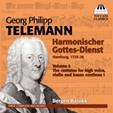 Two
pieces of very good news first: this latest volume is well up to the
standard of its four predecessors and toccataclassics.com now offer
their downloads, formerly available only in 192kb/s mp3, in 320kb/s
mp3 with lossless flac at a small premium, commensurate with what you
would expect to pay from other providers.
Two
pieces of very good news first: this latest volume is well up to the
standard of its four predecessors and toccataclassics.com now offer
their downloads, formerly available only in 192kb/s mp3, in 320kb/s
mp3 with lossless flac at a small premium, commensurate with what you
would expect to pay from other providers.
On some of the earlier volumes the cantatas were more akin to what we
would expect from a Bach cantata, but all these are for a single soprano
soloist. The solo singing from Mona Julsrud is excellent – ethereal
in quality to such an extent that I’d place her not far off Emma
Kirkby – but diction is a real problem, to the point of inaudibility,
which is ironic since care has been taken to pronounce German as it
would have been in Telemann’s time. The notes even make the point
that Telemann required clear diction. That apart, the lossless version
sounds very well indeed.
Recording of the Month
 Johann
Sebastian BACH (1685-1750)
Johann
Sebastian BACH (1685-1750)
Clavierübung III
Stephen Farr (Metzler Organ, Trinity College, Cambridge) – rec.
3-4 April 2013. DDD
Pdf booklet includes chorale texts and full organ specification
RESONUS RES10120 [105:08] – for release by resonusclassics.com
(mp3, aac and lossless)
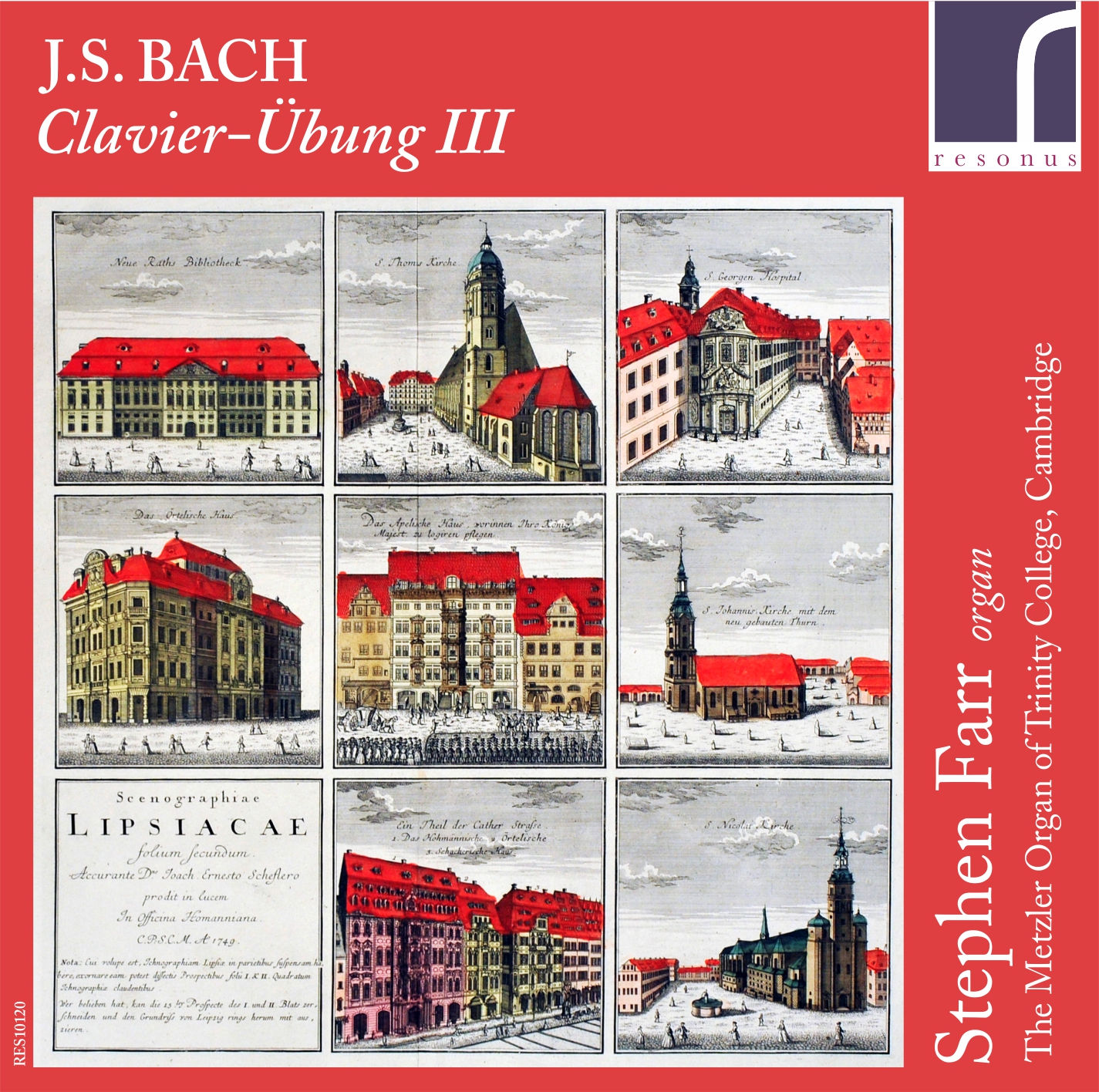 I
received this hot off the press little over a month after the recording
had been made. It won’t be generally available until July 2013
but it’s such an important release that I had to include it in
this edition of DL News. I’ve been looking forward to its release
since it was announced – I mentioned it in my review of the very
fine but very different organ recital of music by Lennox and Michael
Berkeley in 2013/7 DL News. As on Kay Johansen’s highly regarded
recording (Hänssler 92.101), the works from Clavierübung
are bookended by the Prelude and Fugue, BWV522, and the four Duetti,
BWV802-805 are also included.
I
received this hot off the press little over a month after the recording
had been made. It won’t be generally available until July 2013
but it’s such an important release that I had to include it in
this edition of DL News. I’ve been looking forward to its release
since it was announced – I mentioned it in my review of the very
fine but very different organ recital of music by Lennox and Michael
Berkeley in 2013/7 DL News. As on Kay Johansen’s highly regarded
recording (Hänssler 92.101), the works from Clavierübung
are bookended by the Prelude and Fugue, BWV522, and the four Duetti,
BWV802-805 are also included.
All lovers of Bach’s music should be prepared to order this new
Resonus recording in advance, even if you already have a recording of
the Clavierübung, such as the one included in the Teldec-Warner
Complete Works which I recently reviewed in USB format: Recording
of the Month – review
– or Kevin Bowyer’s complete survey for Nimbus, available
on CD or on mp3: Bargain of the Month – review.
My colleague Byzantion has also reviewed the Nimbus set – review
– and I’m indebted to him for being able to point the impecunious
and those who like to compare towards a completely free set of Bach
organ music, performed by James Kibbie of UMich for download in aac
format – here.
For those wanting just a single-CD selection from Clavierübung
III, there’s a fine version on Maya from Malcolm Proud on another
Metzler organ – review
– but I’m not going to make detailed comparisons with that
or the classic Helmut Walcha or the Teldec or Nimbus recordings because
I was so completely sold on this new recording that I have no real reservations.
In the space of two days I’ve listened to two recordings which
have bowled me over – this and a Beulah reissue of Furtwängler
performing Brahms Fourth Symphony, which I’m planning to review
in a separate DL News dedicated to Beulah’s recent album releases
(2PD72 – from iTunes
or Amazon).
The Furtwängler Brahms shines through what remains a rather crumbly
recording despite Beulah’s usual first-rate efforts but this Bach
recording needs no apologies. I received a variety of formats for review
and chose to listen to the highest quality 24-bit/96kHz flac. Resonus
usually offer mp3, aac and 16-bit flac; for higher quality you normally
have to turn to eclassical.com, which may also entail a brief wait.
The sound is excellent and the quality of the release is heightened
by the excellent notes in the pdf booklet, which include the German
texts of the chorales on which Bach wrote organ preludes and a specification
of the Metzler organ at Trinity.
I also downloaded the mp3 version of this recording for burning to CD
for use in the car but I fear that Bach playing of this quality may
prove too excitable for that purpose and lead to dangerous driving.
When it’s dragged to a USB stick and played via the USB socket
of my amplifier, you’d hardly think this was mere mp3.
Recording of the Month
 Wolfgang
Amadeus MOZART (1756-1791)
Wolfgang
Amadeus MOZART (1756-1791)
Piano Concerto No.17 in G, K453 [30:10]
Piano Concerto No.27 in B flat, K595 [29:09]
Angela Hewitt (piano)
Orchestra da Camera di Mantova/Hannu Lintu – rec. July 2011. DDD
Pdf booklet included
HYPERION CDA67919 [59:19] – from hyperion-records.co.uk
(mp3, 16– and 24-bit lossless) [K595/ii available on free Hyperion
Sampler HYP201305]
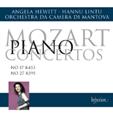 These
two Mozart concertos may not be quite top of the tree in my book –
that would be No.23, K488, with its nearest neighbours as close runners-up
– and I already have so many recordings of each that I recently
cleared out my CDs of Jenö Jandó’s Mozart concertos
(Naxos), but I predict that I shall be regularly playing these new versions.
This is Mozart performance of the highest order – but I expected
that before even the first note began to play on the basis of Angela
Hewitt’s earlier successes on Hyperion. With even better music
here than on her earlier disc of Nos. 6, 8 and 9 – review
and October 2011/2 DL
Roundup – a different conductor, good recording and Hyperion’s
usual quality booklet of notes, this deserves a strong recommendation.
These
two Mozart concertos may not be quite top of the tree in my book –
that would be No.23, K488, with its nearest neighbours as close runners-up
– and I already have so many recordings of each that I recently
cleared out my CDs of Jenö Jandó’s Mozart concertos
(Naxos), but I predict that I shall be regularly playing these new versions.
This is Mozart performance of the highest order – but I expected
that before even the first note began to play on the basis of Angela
Hewitt’s earlier successes on Hyperion. With even better music
here than on her earlier disc of Nos. 6, 8 and 9 – review
and October 2011/2 DL
Roundup – a different conductor, good recording and Hyperion’s
usual quality booklet of notes, this deserves a strong recommendation.
The slightly short playing time is reflected in the download price –
only £7.85 even for the 24-bit.
Wolfgang Amadeus MOZART (1756-1791)
Mass No.19 in d minor, K626 (Requiem)
Elin Manahan Thomas (soprano), Christine Rice (mezzo), James Gilchrist
(tenor), Christopher Purves (bass)
The Choir of King’s College, Cambridge
Academy of Ancient Music/Stephen Cleobury
Pdf booklet with texts and translations included
KINGS KGS0002 [2 CDs: 128:22] – from classicsonline.com
(mp3) or stream from Naxos Music Library
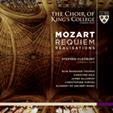 The
17th-century writer Sir Thomas Browne named two things that it would
be very interesting to know but which were ultimately unknowable: What
song the sirens sang [to Odysseus] or what name Achilles assumed when
he hid himself among women. To that list I can add the question of what
version of the Mozart Requiem is the best; the answer is equally
desirable and equally unfathomable. The Naxos Music Library alone lists
dozens of versions, of which the most recent is from Stephen Cleobury,
the second release on King’s own label.
The
17th-century writer Sir Thomas Browne named two things that it would
be very interesting to know but which were ultimately unknowable: What
song the sirens sang [to Odysseus] or what name Achilles assumed when
he hid himself among women. To that list I can add the question of what
version of the Mozart Requiem is the best; the answer is equally
desirable and equally unfathomable. The Naxos Music Library alone lists
dozens of versions, of which the most recent is from Stephen Cleobury,
the second release on King’s own label.
The new recording tries to be all things in offering the conventional
Süssmayr completion together with other versions of what Mozart
didn’t complete as appendices: Maunder’s Amen, Levin
and Beyer’s Sanctus, Druce’s Benedictus, Levin’s
Cum sanctis tuis and Finnissy’s Lacrimosa. So far
so good, especially as the performance is fine, but I think that King’s
have made a mistake in offering a second 66-minute disc as part of the
deal, an audio documentary on the work. That inevitably doubles the
cost for the sake of something that most will want to hear only once.
I enjoyed the performance, especially as, unlike the recent rival from
New College, Oxford, where the soloists are drawn from the choir, professionals
are employed. I thought the New College version – again, an own-label
production – good of its kind (October 2011/2 Download
Roundup), but John Quinn was less impressed – review
– and the use of professionals, especially a soprano rather than
a treble, on the new recording makes a great deal of difference.
The King’s choir sings well, if with some inevitable very slight
shortcomings in the treble department, and the direction is vigorous.
The download sound is good and the booklet is included, but on disc
the main programme is offered on SACD and it’s available from online
dealers for little more (in some cases less: currently £11.75
from one dealer) than the classicsonline.com price of £15.99.
So can I answer that initial question? Only by pointing to a number
of very good versions. If push comes to shove I go for Neville Marriner’s
Philips recording, now available again as a Decca Virtuoso download
(no CD in the UK: £4.99 from 7digital.com).
The mp3 sound is very good, but if you insist on lossless flac, that
will cost you £9.49 from deutschegrammophon.com.
Two other Philips recordings remain very good value:
Sir Colin Davis, with the ‘Great’ Mass and Coronation Mass,
438 8002 (2 CDs, budget price)
Peter Schreier, with Ave Verum Corpus and Coronation Mass, 464
7202 (mid price) – sounding just a little ponderous beside
more recent recordings but a real bargain at 79 minutes playing time.
Harry Christophers (Coro COR16093) is also well worth considering:
October 2011/2 Download
Roundup.
Those interested in hearing Süssmayr’s own Requiem
alongside his completion of the Mozart should try to hear the Avie recording
(AV0047 – review).
It’s available from Naxos Music Library or as a download from classicsonline.com,
but without the booklet, which is a shame since the German texts of
the Requiem, as authorised for use in parts of Austria, will
be unfamiliar.
Bargains of the Month
 Gioachino
ROSSINI (1792-1868)
Gioachino
ROSSINI (1792-1868)
Complete Overtures Volume 1
La gazza ladra [9:50]
Semiramide [12:27]
Elisabetta, Regina d’Inghilterra (Il barbiere di Siviglia)
[7:28]
Otello [8:34]
Le siège de Corinthe [9:34]
Sinfonia in D ‘al Conventello’ [4:03]
Ermione* [8:08]
Prague Philharmonic Choir*
Prague Sinfonia Orchestra/Christian Benda – rec. September 2011.
DDD.
Pdf booklet included
NAXOS 8.570933 [60:04] – from classicsonline.com
(mp3 and lossless)
[‘This is an admirable start to what looks like being a very desirable
series.’ See review
by John Sheppard and slightly less enthusiastic review
by John Whitmore.]
 Complete
Overtures Volume 2
Complete
Overtures Volume 2
Guillaume Tell [11:37]
Eduardo e Cristina [9:17]
L’inganno felice [6:07]
La scala di seta [6:01]
Demetrio e Polibio [6:31]
Il Signor Bruschino [4:52]
Sinfonia di Bologna [5:26]
Sigismondo [8:30]
Prague Sinfonia Orchestra/Christian Benda – rec. September 2011.
DDD.
Pdf booklet included.
NAXOS 8.570934 [58:21] – from classicsonline.com
(mp3 and lossless)
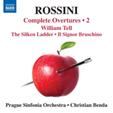
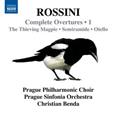 I
got to know five of the Rossini overtures long ago from a recording
on which Pierino Gamba conducted the LSO – still available as a
download from 7digital.com,
though I can’t vouch for the quality – and I’ve owned
or heard many more since then, but these new Naxos recordings are about
as good as it gets. Of the items in common with the older recording,
only la Gazza Ladra packs a little less punch than I recall from
Gamba.
I
got to know five of the Rossini overtures long ago from a recording
on which Pierino Gamba conducted the LSO – still available as a
download from 7digital.com,
though I can’t vouch for the quality – and I’ve owned
or heard many more since then, but these new Naxos recordings are about
as good as it gets. Of the items in common with the older recording,
only la Gazza Ladra packs a little less punch than I recall from
Gamba.
I have to admit that I’m not the greatest fan of Rossini’s
operas – apart from Il Barbiere di Siviglia, Il Turco
in Italia and l’Italiana in Algeri, I don’t know
them all that well, so perhaps I should repair the omission – but
I do very much enjoy the overtures when played with as much panache
as they are here.
My reservations are hardly worth mentioning – perhaps the violins
could tap their bows a bit more vigorously in the Signor Bruschino
Overture and there’s room for at least one more overture on each
volume. The recording is very good, especially in lossless format for
£1 or $1 extra. If you dislike Naxos’s practice of supplying
their lossless flac recordings as one long file, eclassical.com have
Volume 1 in mp3 and lossless – here
– and will no doubt be adding its successor in due course.
There will be two more volumes to complete the set. If you can’t
wait that long, 7digital.com have the ASMF/Neville Marriner 3-disc recording
for £15.99 – here.
You may also wish to add the Toscanini recording of six Rossini overtures
(1956) if you live in a country where copyright laws allow you to download
the Naxos Classical Archives release of these (9.80684, not available
in the USA).
Felix MENDELSSOHN-BARTHOLDY (1809-1847)
Concerto in d minor for Violin, Piano and Strings, MWVO4 (1823) [35:26]
Polina Leschenko (piano)
Richard Tognetti (violin)
Australian Chamber Orchestra
Octet in E flat, Op. 20/MWV R20 (1825) [30:50]
Members of the Australian Chamber Orchestra
(Richard Tognetti, Helena Rathbone, Satu Vänskä, Rebecca Chan
(violins)
Christopher Moore, Nicole Divall (violas)
Timo-Veikko Valve, Julian Thompson (cellos)
Pdf booklet included
BIS-SACD-1984 [66:58] – from eclassical.com
(mp3, 16– and 24-bit lossless)
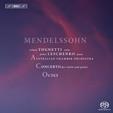 Two
works by the youthful genius Mendelssohn, of which the Octet
is deservedly well known, the concerto far less so. There are just four
recordings of the concerto; this is the only version with this coupling.
For two of the others, on Harmonia Mundi, with the a minor Piano Concerto,
and Claves with the Violin Concerto see review.
There’s an earlier BIS recording on BIS-CD-713, coupled
with shorter Mendelssohn works.
Two
works by the youthful genius Mendelssohn, of which the Octet
is deservedly well known, the concerto far less so. There are just four
recordings of the concerto; this is the only version with this coupling.
For two of the others, on Harmonia Mundi, with the a minor Piano Concerto,
and Claves with the Violin Concerto see review.
There’s an earlier BIS recording on BIS-CD-713, coupled
with shorter Mendelssohn works.
I share Dave Billinge’s view that the modern grand piano tends
to overshadow proceedings a little too much but I also share his overall
recommendation of the performance and recording – review.
I enjoyed hearing the earlier work but if it’s just the wonderful
Octet that you’re looking for, there are many very fine
alternatives which (just) have the edge on the BIS recording, including:
• Resonus RES10101: Eroica Quartet and friends –
the original unrevised version, well worth having not just for curiosity
sake but very well performed and recorded (download only – March
2011/2
DL Roundup)
• Wigmore Hall Live WHL001: Nash Ensemble (with Beethoven
Clarinet Trio) – see March 2009 DL
Roundup. As well as the emusic.com download listed there, classicsonline.com
offer this in better quality mp3 and with booklet for £4.99.
Antonín DVOŘÁK (1841-1904)
String Quartet No.12 in F, Op.96, (American) [26:40]
Bedřich SMETANA(1824-1884)
String Quartet No.1 in e minor, (From my Life) [26:32]
Tokyo String Quartet (Martin Beaver, Kikuei Ikeda (violins), Kazuhide
Isomura (viola), Clive Greensmith (cello)) – rec. February 2006.
DDD/DSD.
Pdf booklet included.
HARMONIA MUNDI HMU807429 (37862837) [53:11] – from eclassical.com
(mp3, 16 and 24-bit lossless)
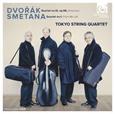 The
pairing of these two quartets takes us down a well-trod path. I was
expecting this valedictory recording from the Tokyo Quartet to be very
special and, indeed, I did very much enjoy it, but there is some very
strong competition, coupled thus – from the Alban Berg Quartet,
download only – or differently.
The
pairing of these two quartets takes us down a well-trod path. I was
expecting this valedictory recording from the Tokyo Quartet to be very
special and, indeed, I did very much enjoy it, but there is some very
strong competition, coupled thus – from the Alban Berg Quartet,
download only – or differently.
Perhaps my expectations were too high, but I didn’t immediately
warm to this understated account of the American Quartet and
I see that at least one other reviewer (not MusicWeb International)
thinks the opening movement rather too relaxed. It’s not until
the third movement that this performance comes alive for me and then
the quality of their playing captures the quirkiness of the music and,
here and in the finale, makes up for the slight disappointment earlier.
For satisfaction in every movement, however, though downloads from these
sources are available only in mp3 sound, I’m still likely to turn
to the Wihan Quartet (with Quartet No.11, Nimbus Alliance NI6114
– review)
or the Pavel Haas Quartet (with No.13, Supraphon SU4038-2: Recording
of the Month – review
and review;
November 2011/2 DL
Roundup.) Both of these are slightly more generously coupled, too,
than the new Harmonia Mundi, which has room to spare for another quartet
– I have an old Hungaroton CD with the Bartók Quartet offering
the Debussy and Ravel Quartets together with the American Quartet, 74
minutes and at the budget price of £3.99 when it was last available.
The Tokyo Quartet, however, respond much more idiomatically to Smetana’s
dramatic quartet – if you don’t know the work, it catalogues
the ups and downs of his life, the latter most vividly depicted by the
sustained note, almost a screech of despair, which signalled the onset
of the composer’s deafness. I hate to use the cliché that
it’s a game of two halves and it’s almost worth having the
recording for the Smetana alone, though there are other very fine accounts,
notably from the Škampa Quartet on another Supraphon recording
(with Quartet No.2, SU3740-2) or the Dante Quartet (very good
value with Quartet No.2 and Sibelius String Quartet, Hyperion CDA67845
– review
and August 2011/1 DL
Roundup).
The contrast between the playful, dancing opening of the finale and
that awful screech is well marked on the new recording, though the Tokyo
Quartet could make rather more of the horror. The Moyzes Quartet on
Naxos play the light-hearted opening a little too seriously and under-play
the horror so, although they offer good value with the two quartets
plus My Home at budget price, I can’t really recommend them.
The Alban Berg Quartet, recorded live (EMI, download only), in their
account of the finale give premonitory warnings of the catastrophe to
come but without thereby diminishing the effect of the screech that
effectively ended Smetana’s career. With a good account of the
American Quartet as coupling, this could be your ideal recommendation,
especially as classicsonline.com
have it for £6.99 (mp3 only as against $9.57 for the eclassical.com
Harmonia Mundi download in mp3 and lossless).
The 24-bit Harmonia Mundi recording is, unusually, at 88.2 kHz, a frequency
which Windows doesn’t support, unless you have Windows 8. If you
have a DAC and it doesn’t automatically select the right frequency,
choose 44.1.
Emmanuel CHABRIER (1841-1894)
Joyeuse marche (c. 1888) [3:40]
Overture to ‘Gwendoline’ (1879-1885) [9:23]
Habañera (c. 1885) [4:11]
España (1883) [6:12]
Lamento (1874) [7:44]
Bourrée fantasque (1897) [6:44]
Suite pastorale (c. 1888) [19:05]
Three movements from ‘L’étoile’ (1877) [8:11]
Two movements from ‘Le Roi malgré lui’ (1884-1887)
[12:28]
Orchestre de la Suisse Romande/Neeme Järvi
rec. 27-29 June 2012, Victoria Hall, Geneva, Switzerland
Pdf booklet included
CHANDOS CHSA 5122 [77:15] – from theclassicalshop.net
(mp3, 16-bit lossless & 24/96 Studio stereo and surround)
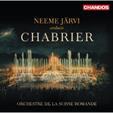 Talk
about bearding the lion in his den; here Järvi confronts Ansermet
in repertoire for which the latter was justly famous (review).
Järvi’s recent Raff recording with the OSR impressed me a
great deal (review)
as did the Victoria Hall’s new, cutting-edge recording facilities.
I do find this conductor rather po-faced at times, not to mention rhythmically
inflexible – as in his Suppé collection – so I wondered
how he would fare against Ansermet, that most natural and spontaneous
of musicians. The latter’s devotion to Chabrier is well known,
and his breathtaking and buoyant performance of España
– recorded in fine stereo in 1964 – is peerless.
Talk
about bearding the lion in his den; here Järvi confronts Ansermet
in repertoire for which the latter was justly famous (review).
Järvi’s recent Raff recording with the OSR impressed me a
great deal (review)
as did the Victoria Hall’s new, cutting-edge recording facilities.
I do find this conductor rather po-faced at times, not to mention rhythmically
inflexible – as in his Suppé collection – so I wondered
how he would fare against Ansermet, that most natural and spontaneous
of musicians. The latter’s devotion to Chabrier is well known,
and his breathtaking and buoyant performance of España
– recorded in fine stereo in 1964 – is peerless.
Undaunted, Järvi starts with a bracing – and rhythmically
supple – Joyeuse marche, in which the timps, bass drum and
percussive interjections are superbly caught. Balances are very pleasing
and there’s plenty of fine detail too. Even more intoxicating is
the overture to Chabrier’s ‘serious’ opera Gwendoline,
whose turbulent opening instantly recalls Bizet’s Carmen.
It also has a jaunty interlude that brings to mind an Ealing comedy
before it builds to a big, surf-breaking climax that stays this side
of good taste – but only just. I’ve not heard this piece before
and I played it several times, if only to marvel at the polished playing
and at the laugh-out-loud excitement of the closing bars.
Järvi follows that with a silky and sensitive Habañera
– goodness, how well the OSR are playing for him – although
I much prefer the stronger dynamic contrasts and sheer passion of Ansermet’s
more idiomatic account. It says something about the quality of the Järvi
/OSR combination that their detailed and very well sprung España
comes close to supplanting Ansermet’s. Almost, but not quite, although
the ‘tingle factor’ in the Chandos recording is hard to beat.
So different from the elegiac Lamento, graced with some lovely
cor anglais playing from Alexandre Emard; not a great work, but a little
gem nonetheless. Ditto Mottl’s transcription of the vigorous Bourrée
fantasque, even if it doesn’t feel much like Chabrier.
The four miniatures of the Suite pastorale are Chabrier’s
transcriptions, and they have all the delicacy and point one would expect
from him. As ever, Järvi and the OSR sound ultra-sophisticated,
which isn’t always desirable here. That’s certainly true of
the village dance, which lacks Ansermet’s delectable perk and rustic
charm. That said Sous-bois has a rich Burgundian flavour that
seems entirely apt, and the little Scherzo-valse is crisply done.
All very pleasing – and well played – but Järvi’s
suite isn’t as fresh or as invigorating as Ansermet’s. Remarkably
Decca’s elderly recording doesn’t yield much to Chandos’s
in terms of detail, presence and timbral accuracy, although the tuttis
are clearly strained at times.
What I miss most in Järvi’s Chabrier – and in some of
his more recent recordings – is a sense of personality. Sometimes
he’s just too detached, so that incidental charm and colouristic
touches barely register. The Offenbachian overture to the opéra
bouffe L’Étoile is a case in point; it only sparkles
intermittently. Similarly the two entr’actes are deftly done but
they’re woefully short on character. That said, Järvi makes
amends with an urgent, nicely shaped account of the dancing Fête
polonaise from Chabrier’s opéra-comique about
reluctant royalty, Le Roi malgré lui. Predictably Ansermet’s
performance is more sharply drawn and his rhythms are emphatically accented.
The same applies to these competing versions of the Danse slave.
The lion may have been bearded in his den but he’s still the undisputed
king of this repertoire. If you prefer your Chabrier filtered through
a metropolitan lens – urbane, streamlined – then Järvi’s
your man. However, if you like some extra swing to your rhythms and
a vigorous stomp to your bucolic dances – some dirt on its boots,
as it were – then Ansermet is the one to go for. When the latter’s
Chabrier appears as a high-res download – Universal, please note
– it will be even more desirable than it is already. Still, Järvi
is well worth hearing, not least for the glorious Gwendoline.
Dan Morgan
http://twitter.com/mahlerei
Recommended Bargain Buy
 Maurice
RAVEL (1875-1937) Tzigane [11:00]
Maurice
RAVEL (1875-1937) Tzigane [11:00]
Édouard LALO (1823-1892) Symphonie espagnole, Op.21
[32:51]
Karl Amadeus HARTMANN (1905-1963) Concerto Funèbre
for violin and string orchestra * [21:51]
Ida Haendel (violin)
Andre Gertler (violin)*
Czech Philharmonic Orchestra/Karel Ančerl– rec. 1964 and 1968.
ADD.
SUPRAPHON ANčERL
GOLD SU3677-2 [65:44] – from emusic.com
(mp3)
[‘A confident recommendation.’ See review
by Ian Lace and review
by Terry Barfoot.]
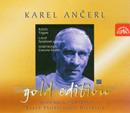 The
Lalo Symphonie – music for violin and orchestra at about
its most easy-going, from 1873 – and the rather tough Hartmann
concerto from that ominous year 1939 make strange bedfellows. The Lalo
has appeared on various Supraphon releases, more obviously coupled,
but these are classic vintage performances and the recordings still
sound fine, though some may be troubled by the close balance of the
soloist in Lalo and Ravel.
The
Lalo Symphonie – music for violin and orchestra at about
its most easy-going, from 1873 – and the rather tough Hartmann
concerto from that ominous year 1939 make strange bedfellows. The Lalo
has appeared on various Supraphon releases, more obviously coupled,
but these are classic vintage performances and the recordings still
sound fine, though some may be troubled by the close balance of the
soloist in Lalo and Ravel.
At £4.20 or less, the emusic.com download is the least expensive
that I can find – amazon.com’s price is almost as much as
buying the physical CD – and the bit-rate of around 236kb/s is
within shouting distance of amazon.co.uk’s usual 256kb/s.
For alternatives, more logically coupled:
Lalo:
• Eloquence 462 4792: Arthur Grumiaux; Lamoureux O/Rosenthal
(with Saint-Saëns, Chausson and Ravel) – review.
The earlier reissue on Philips Concert Classics remains my benchmark.
Hartmann:
• Hyperion CDA67547: Alina Ibragimova/Britten Sinfonia (with
solo violin works by Hartmann) – review
and Download News 2012/24.
• Warner Apex 092740812-2: Thomas Zehetmair/Deutsche Kammerphilharmonie
(with Berg and JanáčekViolin Concertos, at budget price) –
review.
For more Lalo:
• Overture Le Roi d’Ys; Violin Concerto in F,
Op.20; Scherzo in d minor; Concerto russe, Op.29: Chandos
CHAN9759: Olivier Charlier (violin); BBC Philharmonic/Yan Pascal
Tortelier – rec. 1999. DDD. [71:18] – with pdf booklet from
theclassicalshop.net
(mp3 and lossless) or stream from Naxos Music Library
• Fantaisie norvégienne Hyperion Helios
CDH55396: Philippe Graffin (violin); Ulster Orchestra/Yan Pascal
Tortelier (with Lalo Guitarre, Fauré, Saint-Saens, etc.:
Rare French Works for violin and orchestra) – from hyperion.co.uk
(mp3 and lossless): see DL Roundup March
2011/2.
None of this music has quite the immediate appeal of the Symphonie
espagnole, but it’s all very enjoyable, especially the Concerto
russe, and you’re unlikely to find better performances or recordings.
I’ve already recommended the inexpensive Hyperion Helios collection
but the Chandos album is also a desirable purchase.
There’s an alternative version of the Concerto russe on
BIS-SACD-1890, which Byzantion thought appealing if sometimes
straight-laced (review)
– download from eclassical.com
(mp3, 16– and 24-bit lossless) or stream from Naxos Music Library.
Georges BIZET (1838-1875)
Symphony in C [26:59]
Jeux d’Enfants – Suite [10:48]
La Jolie Fille de Perth – Suite [12:14]
Orchestre de la Suisse Romande/Ernest Ansermet – rec.c.1960. ADD
HALLMARK [50:01] – from emusic.com
(mp3)
[also reissued with other works and music by Turina on a 2-CD Eloquence
set, 480 0457 – see review.]
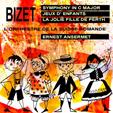 For
£2.52 or less, this is very good value. The music, of course,
is Beecham territory and Ansermet is not quite in that league in conveying
the music’s magic – who is? – but he makes a very good
shot at it. Compare Ansermet’s light-hearted and enjoyable account
of the third movement of the Symphony with Beecham – review
– and you’ll miss the way in which the latter makes the music
bounce along as if of its own accord. Nevertheless, whichever version
you choose, the Symphony is an essential listen and this version certainly
won’t fail to convey its attractions. It’s a more attractive
proposition than the recent Virgin CD from Paavo Järvi – review.
For
£2.52 or less, this is very good value. The music, of course,
is Beecham territory and Ansermet is not quite in that league in conveying
the music’s magic – who is? – but he makes a very good
shot at it. Compare Ansermet’s light-hearted and enjoyable account
of the third movement of the Symphony with Beecham – review
– and you’ll miss the way in which the latter makes the music
bounce along as if of its own accord. Nevertheless, whichever version
you choose, the Symphony is an essential listen and this version certainly
won’t fail to convey its attractions. It’s a more attractive
proposition than the recent Virgin CD from Paavo Järvi – review.
If you’re going for the Beecham, go one better than the single
CD and obtain his Bizet (Symphony, L’Arlésienne Suites,
Carmen orchestral music, Patrie and Roma) in Sir
Thomas Beecham conducts French Music (EMI 9099322, 6 CDs for
around £18 – review;
download for £13.99 from classicsonline.com),
where you’ll also find the Lalo Symphony which was originally coupled
with the Bizet.
The Decca recording still sounds well apart from an occasional, almost
inaudible thud lasting for three or four revolutions of the LP source.
The 1954 mono recording of the Symphony is also available, coupled with
the Overture Patrie, on Naxos Classical Archives, from classicsonline.com
(mp3).
Pyotr Ilyich TCHAIKOVSKY (1840-1893) Souvenir de Florence,
Op.70 [34:16]
Anton ARENSKY (1861-1906) String Quartet No.2 in a, Op.35 [26:27]
The Raphael Ensemble – rec. 1993. DDD.
Pdf booklet included.
HYPERION HELIOS CDH55426 [60:43] – from hyperion-records.co.uk
(mp3 and lossless)
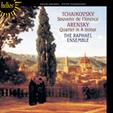 Reviewing
the Keller Quartet’s recording of the Souvenir de Florence on
a budget-price 2-CD Warner Apex set, with the three String Quartets
– review
– I thought it worth paying a little extra for other recordings,
including this Hyperion when it was at full price. The coupling of a
work dedicated to Arensky’s mentor, Tchaikovsky when the third
movement (track 6) is a set of luscious variations on the better-known
composer’s music, makes this recording particularly apt. Now that
this well-recorded CD is available less expensively, it’s even
more desirable and I was pleased to make its acquaintance again.
Reviewing
the Keller Quartet’s recording of the Souvenir de Florence on
a budget-price 2-CD Warner Apex set, with the three String Quartets
– review
– I thought it worth paying a little extra for other recordings,
including this Hyperion when it was at full price. The coupling of a
work dedicated to Arensky’s mentor, Tchaikovsky when the third
movement (track 6) is a set of luscious variations on the better-known
composer’s music, makes this recording particularly apt. Now that
this well-recorded CD is available less expensively, it’s even
more desirable and I was pleased to make its acquaintance again.
Sir Edward ELGAR (1857-1934)
Symphony No. 2 in E flat, Op.63 (1909-11) [54:44]
Sospiri for strings, harp and organ, Op.70 (1913-14) [3:50]
Elegy for strings, Op.58 (1909) [4:14]
Royal Stockholm Philharmonic Orchestra/Sakari Oramo
Pdf booklet included.
BIS-SACD-1879 [63:54] – from eclassical.com
(mp3, 16– and 24-bit lossless) or stream from Naxos Music Library
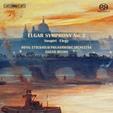 Dr
Johnson once famously compared a female preacher to a dog standing on
its hind legs – it was not well done but the miracle was that it
was done at all. For some reason, though we don’t expect French
music to be performed or conducted solely by French musicians, or German
music by Germans, English music seems to defy all but British and American
conductors. There are some remarkable exceptions – Karajan’s
Planets (Decca and DG), Monteux’s Enigma Variations
and Haitink’s Vaughan Williams symphonies spring at once to mind
– but they are the exception rather than the rule. So is this Elgar
recording one of those exceptions or more of the dog-on-hind-legs variety?
Dr
Johnson once famously compared a female preacher to a dog standing on
its hind legs – it was not well done but the miracle was that it
was done at all. For some reason, though we don’t expect French
music to be performed or conducted solely by French musicians, or German
music by Germans, English music seems to defy all but British and American
conductors. There are some remarkable exceptions – Karajan’s
Planets (Decca and DG), Monteux’s Enigma Variations
and Haitink’s Vaughan Williams symphonies spring at once to mind
– but they are the exception rather than the rule. So is this Elgar
recording one of those exceptions or more of the dog-on-hind-legs variety?
I’m giving Geoff Molyneux the first word on the matter because
he likes it somewhat better than I did at first, though not much more,
and I’ve come round more to his opinion:
As someone who first heard the great Elgar orchestral works under Boult,
Barbirolli and especially Sargent at the Proms, it comes as quite a
surprise to hear this light-sounding all– dancing first movement
conducted by Sakari Oramo. The performance does not really catch fire
until the lead-in to the recapitulation which is magnificent and the
best part of the movement. Oramo judges it very well and creates some
real excitement and passion as the music moves forward. What a contrast
with Barbirolli, whose extremes of tempo change and rubato, together
with his passion, emotion and drama may be a bit too much for some listeners.
Barbirolli’s is the slowest performance and the small ritenuto
and poco sostenuto just before 11 is very slow indeed. Actually
the ensuing second theme of the second subject is played much more slowly
than Elgar’s tempo marking. Indeed this passage almost grinds to
a halt at one point. But I love it!!
This is idiomatic Elgar performance to me. More middle of the road is
Sir Malcolm Sargent from the Colston Hall, Bristol from the 1960s. This
live radio broadcast sounds very good, and apart from some bad brass
playing here and there, especially and unfortunately near the beginning,
the BBC Symphony Orchestra plays magnificently. I don’t feel that
Colin Davis’s performance is a contender here. The first bar is
far too stretched out, and we hear Sir Colin groaning in the background.
Then follows the main theme which starts at a reasonable speed but gets
faster and faster as Sir Colin realises that he started too slowly in
the first place. Also I really dislike the Barbican acoustics on this
recording.
The best modern recording of this movement is surely that by Sir Mark
Elder and the Hallé. The sound is beautifully integrated and
very idiomatic. The strings are rich in tone, the rubato is perfect
and the piece is played so expressively. Listen to the second subject!
The whole movement is passionate and exciting and the climaxes are approached
convincingly. It is the best recorded version too. Elgar’s own
recording from the 1930s is the fastest of all, probably because of
the difficulties in recording techniques of the time, but it is nevertheless
of great historical interest.
Oramo sets the sad tone of the second movement funeral march very well.
The strings of his orchestra are not so rich, and the brass not so well-integrated
as in other recordings. There is some attractive dolcissimo playing
at 71 and this builds to a fine climax. Further on the ppp (very,
very soft) is so quietly played it was quite difficult to set the volume
of my equipment to accommodate this as well as the very loud passages.
I don’t much like the oboe a bit further on in his important solo
passage and a little later the intonation of the whole orchestra is
not quite of the perfection we expect at this level of performance.
Again the brass tone is not quite integrated and the horns in particular
are not quite up to the mark. I can only describe the playing of the
Hallé under Mark Elder as absolutely fabulous in this movement.
The string section is of the highest international standards producing
a devastatingly beautiful sound, as indeed do the brass and woodwind.
Andrew Davis with the Philharmonia Orchestra on Signum Classics knocks
nearly two minutes from Elder’s timing in the second movement,
and he has a somewhat less indulgent view. It is a compelling performance
nevertheless, but Andrew Davis seems to want to keep the music moving
at all costs.
Next we come to the third movement, nightmarish with moments of lyrical
relief. Oramo’s is the fastest performance I heard whilst reviewing
this CD, coming in at seven and a half minutes. There is great clarity
in spite of the speed, and the conductor pulls back the second subject
appropriately and it is very attractively played. Although very lightly
and deftly executed, some of the scampering figures in the violins at
the start seem to disappear from audibility. But Oramo doesn’t
seem to pull off the huge climax in the centre of the movement as well
as others. Elgar told an orchestra he was conducting to imagine the
throbbing in the head experienced by a feverish man. The throbbing becomes
worse and worse until it overwhelms all thoughts and feeling. He told
the percussion to ‘give me all your worth! I want you to drown
the rest of the orchestra’.
Most terrifying of all in this passage is Sir Malcolm Sargent but at
the double fortissimo the engineers seem to turn down the volume
slightly and that is a shame. Maybe they were taken by surprise at the
ferocity of the music at this point. Also matchless in this passage
are Barbirolli and Elder. The Hallé of today has the edge over
the orchestra of Barbirolli’s time and some woodwind passages are
a tad out of tune in the Barbirolli with not such a nice tone. Elder
gives a magnificent performance with just the right tempi selected and
perfectly judged rubato, for example when he moves into the first
episode. Elder observes meticulously Elgar’s dynamic markings,
and he and the Hallé give a truly thrilling performance of this
movement. Richard Hickox and the BBC National Orchestra of Wales produce
some fine playing in this movement with some beautifully realised woodwind
solos, but sometimes there is a lack of clarity in the recording and
the orchestra sounds a bit too far back. Jeffrey Tate and the London
Symphony Orchestra also give a fine account of this movement on EMI
Classics.
Again Oramo seems to have a rather lightweight approach to the start
of the Finale, but the orchestra does make a very attractive sound.
The second subject has a sense of Nobilmente but I wonder why
Oramo makes an unmarked diminuendo just before 143. I can see
a reason for getting a little softer, but unlike Elder who does not
do this, Oramo seems to lose momentum here. There is great clarity,
almost clinically so, in the very fast and virtuosic passages written
for the violins at the beginning of the development section. We don’t
often hear such detail at this point and later on fast woodwind figuration
sounds really nice and clean. But sometimes the balance seems wrong.
For example at the beginning of the recapitulation, the main theme in
the cellos marked to be played softly (p) is nearly obliterated
by long sustained notes (soon developing into a countermelody) marked
to be played very softly (pp) in the clarinets and cor anglais.
You can hear the correct balance at this point on the Elder recording
with the Hallé. Sometimes the very soft sections on the BIS recording
are just that bit too soft for my equipment to cope with. I must turn
up the volume for example, just before the ‘Spirit of Delight’
theme towards the end. However Oramo’s closing section is beautifully
and movingly played.
Equally passionate and thrilling as Elder and Barbirolli in this movement
is Sir Adrian Boult and the London Philharmonic Orchestra on EMI Classics,
authoritative and without the excesses of Barbirolli. Boult starts quite
steadily but then makes a gradual but convincing accelerando
(though this is not marked by the composer) leading to the transition
theme. Indeed, on rehearing this recording after a long time, I was
quite surprised at the liberties he takes. Regarding the Barbirolli
performance, it is a tribute to the musicians involved that the ensemble
is so immaculate bearing in mind the indulgent rubato and wide
variety of tempo.
Oramo and his forces give attractive performances of Sospiri
and Elegy as fillers on this disc. Sospiri is given a
gentle and beautifully phrased but swift account coming in at under
4 minutes. Andrew Davis and the BBC Symphony Orchestra give a somewhat
slower account, with a richer, more sumptuous sound. Richer and slower
still are Tate and Barbirolli who take around 5 minutes and more to
explore this music’s expressive possibilities. Elder’s recording
includes a more substantial work, the Introduction and Allegro for
Strings and a fine account it is too, together with a reading of
Shelley’s Spirit of Delight poem.
Sakari Oramo and the Royal Stockholm Philharmonic Orchestra give a very
fine performance of the Elgar second symphony but ultimately I don’t
feel that it stands up well compared with the great recordings of the
past and other versions of more recent times, especially that by Mark
Elder. Although there is sense of purpose and much beauty and clarity
of detail, Oramo’s performance does not reach great heights of
passion and excitement. If you are a newcomer to this work and want
a wonderfully recorded, modern version equal in stature to those of
Boult, Sargent and Barbirolli, the one to go for is Mark Elder and his
fabulous Hallé orchestra. Elder conducts as though he were born
to perform this music. He understands the architecture, passion and
emotion of this music totally and is a match for his illustrious forbear
in the post of Musical Director of the Hallé. Truly wonderful
conducting and playing then, and this recording will be the one to join
those of the three great conductors of yesteryear already on my shelves.
Geoffrey Molyneux
Sakari Oramo gets off to such a shaky and uncertain start as almost
made me write off his performance, but it develops into a sensitive
account about half way through the first movement. Even then there are
moments when Oramo and his performers seem to mistake hesitancy for
sensitivity, so my impression by the end of that opening movement was
that this was a very good effort rather than a success, though I have
to admit that the climaxes are really stunning. It’s not so much
that Oramo is too slow – at 17:45 he takes just 15 seconds longer
than Sir Adrian Boult with the LPO on his budget-price 2-CD set of the
symphonies, Introduction and Allegro, In the South, etc.
(EMI British Composers 3821512: Bargain of the Month –
review.
Download in 320kb/s mp3 from sainsburysentertainment.co.uk
for £6.99.) – it’s just that he seems to take a
roundabout route getting there.
On Lyrita, Boult takes a minute less, just 16:31, for this movement.
I know that many prefer that recording, but I’m not among them,
largely because Boult was browbeaten into abandoning his principle of
dividing first and second violins left and right. As Christopher Howell
notes in his review, Boult never was the man to make the opening of
this symphony explode off the page, but on EMI he urges rather than
drives the music forward in such a way as to give us a clear topographical
demonstration of where the music is coming from and where it’s
going in a way that Oramo never quite manages.
If, for any reason, Boult is not your man, his student Vernon Handley,
again with the LPO, in 1980, also shows how to make a time of 17:36
minutes not seem over-long for this movement when it’s conducted
with a clear sense of direction. (Budget-price Classics for Pleasure
5753062, with Sea Pictures. I haven’t found a download
that is less expensive than the CD, which you should find for around
£6.) Elgar himself may have polished off the movement in 14:36
and the result is undeniably bracing, but the decision may well have
had much to do with providing suitable breaks at the ends of 78rpm sides.
(Naxos Historical 8.111260, with Cello Concerto or download EMI
complete 9-CD edition from classicsonline.com
in 320kb/s mp3 for £13.99). Even Sir Georg Solti, who modelled
his Elgar performances on the composer’s own timings, doesn’t
quite manage that, at 15:29. (Double Decca, with Symphony No.1,
etc.)
In the slow movement the new recording is more successful but it’s
still Boult who shows it to us in a single span. At that point I originally
gave up on this recording and suggested to Geoff Molyneux that I’d
welcome his thoughts, without telling him what I thought. He has made
me listen again and I have to say that I feel more sympathetic than
I did first time round – maybe I was in the wrong mood or the very
different Boult interpretations were too much at the back of my mind.
I haven’t analysed the remaining two movements too closely because
I mostly enjoyed hearing them, though I share Geoff’s reservations
even about these movements and about the place of this performance overall.
Apart from the odd balance problem, which troubled me less than it did
Geoff, perhaps because he listened to the streamed version, the recording
is good, though even the 24-bit is only at 44.1kHz.
Most of the recordings which Geoff compared are available from Naxos
Music Library and for download from classicsonline.com:
• Barbirolli: Symphonies 1 and 2, In the South,
Serenade – here
– only £5.99. Sainsburysentertainment.co.uk have the 5-CD
set Barbirolli conducts Elgar for £19.99 – here.)
• Tate: Symphonies 1 and 2, Cockaigne, Sospiri
– here
– excellent value at £3.99 for a 2-CD set
• Elder: Symphony No.2, Introduction and Allegro
– here
• Andrew Davis (Signum): Symphonies 1 and 2, Froissart
– here.
(NB: less expensively available from 7digital.com)
There’s also his earlier Warner recording of Symphony No.2, In
the South – here
– very good value on Apex at £3.99.
• Colin Davis: Symphony No.2 – here
– or Symphonies 1-3 for the same price as the Second alone, at
£7.99, from 7digital.com.
The Hickox performance (Chandos CHSA5038, with In the South)
can also be streamed from Naxos Music Library but the download is best
purchased in mp3 or lossless from Chandos’ own website, theclassicalshop.net.
My safest recommendation in my January 2010 Download
Roundup.
Richard STRAUSS (1864-1949)
Don Quixote, Op. 35. Fantastic Variations on a theme of knightly
character* [40:11]
Till Eulenspiegels lustige Streiche, Op. 28 [14:59]
*Alban Gerhardt (cello); *Lawrence Power (viola)
Gürzenich-Orchester Köln/Markus Stenz – rec.6-9 January
2012. DDD.
Pdf booklet included
HYPERION CDA67960 [55:11] – from hyperion-records.co.uk
(mp3, 16– and 24-bit lossless). [Excerpt included on Hyperion free
April 2013 Sampler.]
[See also review
in 2013/7 DL News.]
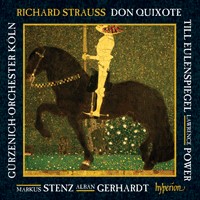 Right
from the start of this performance it is clear that the conductor has
the measure of the work. We are delighted by the deft touch and clarity
of detail. Indeed Stenz and his soloists are able to match Karajan with
rich luxuriant sound where needed but with much greater clarity in the
more complex sections where everything you want to hear can be heard,
and this adds to the cumulative effect of these passages.
Right
from the start of this performance it is clear that the conductor has
the measure of the work. We are delighted by the deft touch and clarity
of detail. Indeed Stenz and his soloists are able to match Karajan with
rich luxuriant sound where needed but with much greater clarity in the
more complex sections where everything you want to hear can be heard,
and this adds to the cumulative effect of these passages.
There is lovely tone from the winds in the introduction and a velvety
rich sound from the second violins and violas in their motives representing
Quixote’s courtesy, followed by a gorgeous, rich and very German
sounding oboe depicting Dulcinea.
Sometimes some solos seem a bit too far towards the back of the texture.
For example the violin solo here sounds distant, but remarkable clarity
is achieved in this complex, latter part of the introduction. Now and
then Karajan has more intensity and drama, for example when the trumpets
and tuba suddenly interrupt Dulcinea’s theme on the oboe. Karajan’s
recording is much more resonant and this seems rather old-fashioned
nowadays, and on repeated hearings I began to develop a preference for
the new Hyperion. As much as I like Pierre Fournier’s often intense
and fabulous playing on the Karajan recording, he is matched by Alban
Gerhardt, now established as one of the best cellists around. He is
strong and robust as we begin Variation 1 in which Quixote attacks the
giants (windmills) and the Cologne band produces some fabulous playing
in the battle with the sheep. However I felt that Karajan’s flutter-tonguing
winds sound rather more sinister and menacing.
Variation 4 is suitably dramatic at the start and very impressively
played with strong rhythmic vitality. However in the second section
where the trumpets, trombones and bassoons play slowly in unison, the
clarinet interjections can barely be heard at the start, sounding too
distant. Variation 5 takes us into a haunting, moonlit night as Quixote
keeps vigil over his imaginary love. The cello solo is beautifully and
movingly played by Alban Gehardt. The ensemble is immaculate in the
ensuing lively variation. Of course Strauss’s orchestration is
extraordinary and wonderful. In Variations 7 and 8, representing the
Ride through the air and the Ill-fated voyage on the enchanted boat,
the Cologne orchestra depicts these scenes in performances of great
clarity in this complex music. Hyperion’s suitably spacious recording
reliably accommodates wind machine and all. After the drama of the final
variation, the Finale representing the death of our hero is very movingly
and beautifully played by Gerhardt and the orchestra.
Whilst both Gerhardt and Power are magnificent I think that the real
star of this performance is Marcus Stenz who conducts and shapes the
piece with great skill, musicality and insight.
Till Eulenspiegel is a great masterpiece with musical depictions
of Till’s merry pranks, but even if you know nothing of the story,
the piece works as a symphonic and organic whole. This performance sounds
lean and clear and some passage are more swift than usual. The opening
section dances merrily along with lightness of touch. There is much
clarity here compared with more traditional approaches to this work.
Recordings such as the fine performance given by Haitink and the Concertgebouw
on Philips are more resonant and warm sounding. This can be heard right
from the start of Haitink’s recording in which the Introduction
is also a bit slower.
Once again, Stenz demonstrates a real mastery of the different moods
and ever-changing tempi in Till. The orchestral playing is first
class and the performance is a match for any of the great performances
already available. Highly recommended.
Geoffrey Molyneux
Sergei RACHMANINOV (1873-1943)
Symphony No. 1 in d minor, Op.13 (1895) [45:32]
Piano Concerto No. 1 in f sharp minor, Op. 1 (1891, rev. 1917) [24:37]
Yevgeny Sudbin (piano)
Singapore Symphony Orchestra/Lan Shui – rec. August 2012, Esplanade
Concert Hall, Singapore
pdf booklet included
BIS-SACD-2012 [70:58] – from eclassical.com
(mp3, 16/44.1 & 24/96 lossless)
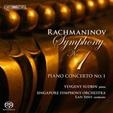 Lan
Shui and the Singapore Symphony feature in one of my favourite BIS collections,
Seascapes, released back in 2007 (review).
Musically and sonically this is one of the label’s finest recordings,
and I can’t recommend it highly enough. That’s the good news;
the not so good is that their take on Rachmaninov’s Second Symphony
lacks essential fire (review).
As for pianist Yevgeny Sudbin, who made such an impact with his bracing
account of Tchaikovsky’s First Piano Concerto, he’s already
given us the Paganini Rhapsody – coupled with Rachmaninov’s
Third Symphony – both of which were welcomed by Dominy Clements
(review).
Lan
Shui and the Singapore Symphony feature in one of my favourite BIS collections,
Seascapes, released back in 2007 (review).
Musically and sonically this is one of the label’s finest recordings,
and I can’t recommend it highly enough. That’s the good news;
the not so good is that their take on Rachmaninov’s Second Symphony
lacks essential fire (review).
As for pianist Yevgeny Sudbin, who made such an impact with his bracing
account of Tchaikovsky’s First Piano Concerto, he’s already
given us the Paganini Rhapsody – coupled with Rachmaninov’s
Third Symphony – both of which were welcomed by Dominy Clements
(review).
At the time of writing this new release was part of eclassical’s
weekly discount offer, in which the 24-bit flacs are downloadable for
the same price as the 16-bit versions. It’s a shrewd strategy that
offers impecunious listeners a taste of high-res music at a very sensible
price but what of the performances? My first impressions of this Op.
13 are mixed, to say the least. The opening movement certainly has necessary
gravitas – and a lovely vein of lyricism – but if you prefer
sheer heft and energy others, such as Vladimir Ashkenazy and the Concertgebouw
on Decca, are probably a better choice.
That said, the playing of these Singaporeans is always committed and
the recording is good, if not spectacular. It’s only when one comes
to the characterful Allegro animato that this performance sounds
a trifle bland compared with the best. Animated it isn’t, and robbed
of vital momentum the music is inclined to stretch and sag. Still, there’s
some pointful playing here, and the Larghetto has its share of
melting moments. More controlled than most this is a reading that may
not make an impact first time around; indeed, I found that subsequent
auditions were more revealing and rewarding.
The start of the Allegro con fuoco is arresting – fine contributions
from the trumpets and side drum – but tension wanes quickly thereafter.
It seems Lan Shui doesn’t have a particularly strong or intuitive
grasp of the symphony’s structure, and that makes for a sometimes
piecemeal performance. Just sample Ashkenazy here and that lack of cohesion
is all too obvious. Listening to the repetitive finale – bombastic
is the better word – it amuses me that the man who wrote it took
such a withering view of that extended march in Shostakovich’s
‘Leningrad’; that said, if you really want to be bludgeoned
into submission just listen to Ashkenazy.
It’s clear from the very first bars of the concerto that Sudbin
brings the same nervous energy to the piece that he did to the Tchaikovsky
First. Add to that much-needed weight and thrust and this has all the
makings of a very fine performance. I do like his heated rhapsodising,
the very antithesis of Valentina Lisitsa’s more inward reading
for Decca, and his focus is unwavering. The orchestra are kept on their
toes throughout, and their crisp, emphatic tuttis are thrilling. Goodness,
Sudbin is a remarkable pianist, and how fortunate that he and his magnificent
Steinway D are so sympathetically recorded by Ingo Petry and his dedicated
team.
The Andante is glorious, with wonderfully refined and deeply
reflective playing from orchestra and soloist respectively; they also
acquit themselves well in the mercurial Allegro vivace, where
precision and passion are yoked to intoxicating effect. As much as I
warmed to Lisitsa’s view of this work Sudbin’s very different
one is ample proof that great music responds to a myriad of interpretations.
Indeed, in my Lisitsa review – not yet published at the time of
writing – I speculated that Sudbin’s Rachmaninov could just
be the strong and consistent cycle we’ve all been waiting for.
Listening to this terrific Op. 1 I’m now sure of it.
If only this performance of the First Symphony were as gripping as the
concerto this would be my Recording of the Month. At least downloading
allows one to mix and match, so if it’s Sudbin you want just buy
the tracks you want. I’ve now downloaded his Paganini Rhapsody
which, on first acquaintance, sounds every bit as exciting and insightful
as his Op. 1. The pdf booklet is up to the high standards of the house.
A slow-burning version of the symphony that rewards repeated hearing,
and a fierily eloquent concerto that burns with the best of them.
Dan Morgan
http://twitter.com/mahlerei
Like Dan, I thought this version of the First Symphony slightly lacking
in power in places, to the extent that I found my attention wandering
at times, but that may be because the first recording that I ever heard
of this neglected work, Ormandy and the Philadelphia Orchestra (CBS,
now Sony SB2K63257, all three symphonies on 2 CDs) is lurking
in the back of my mind – older readers will remember that version
of the opening of the finale used as the music for Panorama.
I can’t find that as a download, but the CD set is inexpensive.
Alternatively, there’s the winning Chandos recording, with the
even more neglected Youth Symphony and The Isle of the Dead (CHAN10475,
BBC Phil/Noseda) which I reviewed in the 2012/24 DL
News – see also review
by Bob Briggs – and that can be downloaded in mp3, 16– and
24-bit lossless from theclassicalshop.net.
Lan Shui’s finale may not open in quite such a blaze of glory as
it does from Ormandy – a little more fuoco would have been
welcome – but if the movement comes in a bit like a lamb, it certainly
goes out like a lion.
If you buy the recording for the sake of the First Piano Concerto –
though, as Dan suggests, you can purchase that separately – you’ll
certainly be getting a better performance of the symphony than the one
over which Glazunov presided for its premiere, a débacle which
caused Rachmaninov’s nervous breakdown, from which he emerged to
compose the Second Piano Concerto and dedicate it to his therapist.
The first concerto is much less of a warhorse than its successor and
it’s comparatively infrequently performed, often in tandem with
the equally neglected fourth concerto, as on another BIS recording with
Noriko Ogawa, the Malmö SO and Owain Arwel Hughes (BIS-CD-975)
which I liked – September 2012/2
DL Roundup – better than did Christopher Howell – review.
My benchmark for this work remains the 2-CD Hyperion recording of all
four piano concertos (CDA67501/2: Stephen Hough; Dallas SO/Andrew
Litton – December 2011/2 DL
Roundup); though that isn’t available for download, for copyright
reasons, the CD set comes at mid price. Alternatively, theclassicalshop.net
offers the Earl Wild and Jascha Horenstein recording of all four concertos,
still sounding well despite its age (CHAN7114 – also reviewed
in December 2011/2 DL
Roundup).
Even the Hyperion recording fails to convince me that the neglect of
the First Piano Concerto is too unjust and the same is true of the new
recording, but both come about as close as any set of performers is
ever likely to. Perhaps I’d warm to it more if its successors hadn’t
been such barn-stormers that it suffers by comparison. The 24-bit recording
is very good throughout and the download comes with the full booklet.
For all my minor reservations about the performance of the symphony
and the quality of the concerto, I enjoyed hearing this.
Havergal BRIAN (1876-1972)
Symphony No. 22 ‘Symphonia brevis’ (1964-65) [9:22]
Symphony No. 23 (1965)* [13:44]
Symphony No. 24 in D (1965)* [16:29]
English Suite No. 1, Op.12 (1905-06) [25:51]
New Russia State Symphony Orchestra/Alexander Walker – rec. August
2012. DDD.
*world première recordings
Pdf booklet included
NAXOS 8.572833 [65:27] – from classicsonline.com
(mp3 and lossless) or stream from Naxos Music Library
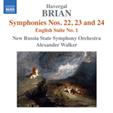 This
is not, as I expected, a Naxos reissue of an earlier Marco Polo release
of Havergal Brian’s music, of which there have been many, with
several still available on that label in download form only, but a new
recording from an equally unlikely quarter and one which offers first-ever
recordings of two symphonies from a productive period in his composing
career. No.22 has appeared before but doesn’t appear to be currently
available in any other form. Forget any ideas of Havergal Brian as a
facile composer whose music is easy to absorb; it all receives a strong
performance here – neither the music nor the performance could
be described as placid.
This
is not, as I expected, a Naxos reissue of an earlier Marco Polo release
of Havergal Brian’s music, of which there have been many, with
several still available on that label in download form only, but a new
recording from an equally unlikely quarter and one which offers first-ever
recordings of two symphonies from a productive period in his composing
career. No.22 has appeared before but doesn’t appear to be currently
available in any other form. Forget any ideas of Havergal Brian as a
facile composer whose music is easy to absorb; it all receives a strong
performance here – neither the music nor the performance could
be described as placid.
In fact, none of these symphonies from the mid-1960s, which can be seen
as linked, yields its secrets easily and I know that I shall have to
try several times if I’m to have any hope of coming to terms with
them. Though I'm lacking a benchmark, the performances sound idiomatic
and they are well recorded.
The English Suite of six decades earlier is smaller beer and
as approachable as Elgar’s Wand of Youth. With such unfamiliar
music the notes are essential and you get them with the classicsonline.com
download, so don’t look elsewhere. Try from the Naxos Music Library
first if you’re unsure.
William HURLSTONE (1876-1906) Piano Quartet in e minor op. 43
(1904) [24:31]
Roger QUILTER (1877-1953) Gipsy Life(1935) [5:24]
Thomas DUNHILL (1877-1946) Piano Quartet in B minor op. 16 (1903)
[31:58]
Arnold BAX (1883-1953) Piano Quartet in one movement (1922) [11:26]
The Primrose Piano Quartet: Susanne Stanzeleit (violin); Susie Mézáros
(viola); Bernard Gregor-Smith (cello); John Thwaites (piano) –
rec. 5-7 September 2003. DDD
MERIDIAN CDE84519 [73:15] – from emusic.com
(mp3)
[‘This is a classic and generous collection of rare English chamber
music. I look forward to much more from this source. Predominantly for
those with a taste for music written under the benevolent but far from
exclusive aegis of Brahms and Dvořák.’ Recording of
the Month: see review
by Rob Barnett.]
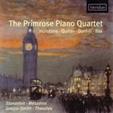 Reviewing
a new recording of the Bax Piano Quartet from the Cappa Ensemble (Nimbus
Alliance NI6230 - review)
led me to this, the only other recording generally available to feature
that work. (The piano/orchestra arrangement, Saga Fragment is
available on Chandos CHAN10159: see below).
Reviewing
a new recording of the Bax Piano Quartet from the Cappa Ensemble (Nimbus
Alliance NI6230 - review)
led me to this, the only other recording generally available to feature
that work. (The piano/orchestra arrangement, Saga Fragment is
available on Chandos CHAN10159: see below).
The new recording is coupled with Piano Quartets by Frank Bridge, William
Walton, and a new work, Noct, by Ian Wilson (b.1964). Both sets
of performances and recordings are good enough for choice of coupling
to be your guide and, while the Bridge and Walton works exist in rival
recordings – though not as many as they deserve: see below for
another Nimbus recording of them – the Ian Wilson work on Nimbus
and the works by Hurlstone, Quilter and Dunhill on Meridian are much
rarer beasts. There’s one rival recording of the Hurlstone (Lyrita
SRCD.2286, with other works by the same composer) and no current
rivals for the Dunhill or Quilter.
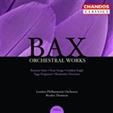 The
bit-rate of the emusic.com download is not great (around 180kb/s) but
the sound is quite adequate and didn’t prevent my enjoyment of
the programme.
The
bit-rate of the emusic.com download is not great (around 180kb/s) but
the sound is quite adequate and didn’t prevent my enjoyment of
the programme.
The recording of Saga Fragment with Margaret Fingerhut as piano
soloist comes on Volume 6 of the mid-price Chandos reissues of Bryden
Thomson’s LPO recordings of Bax’s music (CHAN10159
– review). It’s coupled with the Russian Suite, Four
Songs for tenor and orchestra, Golden Eagle and Romantic Overture,
77:39 in all, and available in mp3 and lossless sound from theclassicalshop.net.
Recommended Bargain Buy
 Joseph
(Josef) HOLBROOKE (1878-1958)
Joseph
(Josef) HOLBROOKE (1878-1958)
Amontillado, Op.123 [9:26]
The Viking (after H.W. Longfellow, The Skeleton in Armour), Op.32
[19:02]
Three Blind Mice Variations, Op.37 [14:37]
Ulalume, Op.35 [12:56]
Brandenburg State Orchestra, Frankfurt/Howard Griffiths
CPO 777442-2 [56:01] – from emusic.com
or classicsonline.com
(both mp3) or stream from Naxos Music Library (no booklet from either).
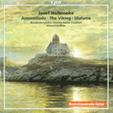 Two
of these works, the first and last, are based on rather gruesome stories
by Edgar Alan Poe, though Amontillado, a story of a blood-feud
which ends with one of the antagonists being lured to a wine-cellar
and walled up alive, is dramatic rather than blood-curdling. The Brandenburg
State Orchestra is hardly among the world’s greats but they make
a good job here under the direction of Howard Griffiths whose recording
of the Finzi Cello Concerto, Eclogue, etc., on Naxos received
the blessing of MWI classical editor Rob Barnett and Terry Barfoot –
review.
Two
of these works, the first and last, are based on rather gruesome stories
by Edgar Alan Poe, though Amontillado, a story of a blood-feud
which ends with one of the antagonists being lured to a wine-cellar
and walled up alive, is dramatic rather than blood-curdling. The Brandenburg
State Orchestra is hardly among the world’s greats but they make
a good job here under the direction of Howard Griffiths whose recording
of the Finzi Cello Concerto, Eclogue, etc., on Naxos received
the blessing of MWI classical editor Rob Barnett and Terry Barfoot –
review.
Both downloads are offered at bargain price – the emusic.com version
for £1.68 or less, sounding acceptable at around 220kb/s, the
classicsonline.com at the highest bit-rate for £4.99, but neither
comes with a booklet.
Joseph HOLBROOKE (1878-1958)
String Sextet in D, Op.43 (Henry Vaughan) [24:40]
Piano Quartet No.1 in g minor, Op.21 [28:03]
Symphonic Quintet No.1 in g minor, Op.44 [27:01]
Endre Hegedüs (piano), New Haydn Quartet, Sandor Papp (second viola),
Janos Devich (second cello) – rec. 1994 and 1995. DDD.
MARCO POLO 8.223736 [79:30] – from eclassical.com
(mp3 and lossless) or stream from Naxos Music Library (with pdf booklet).
Joseph HOLBROOKE (1878-1958)
Sonata in F for violin and piano, ‘The Grasshopper’ (1917
version – Authorised Original Version) [26:20]
Granville BANTOCK (1868-1946)
Sonata in F for viola and piano, ‘Colleen’ (1919) [40:02]
Rupert Marshall-Luck (violin and viola); Matthew Rickard (piano) –
rec. August 2011. DDD
with pdf booklet
EM RECORDS EMRCD003 [67:01] – from classicsonline.com
(mp3) or stream from Naxos Music Library
[See reviews by Rob
Barnett, Nick
Barnard and Jonathan
Woolf.]
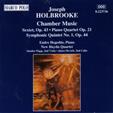
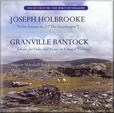 I
can’t claim that Joseph Holbrooke is a neglected genius, but I’ve
been interested in his music ever since a colleague who restricted his
music collection to 20th-century British and American and jazz loaned
me his Lyrita LP of The Birds of Rhiannon. Well, it is a romantic
title, especially if you know the Mabinogion and Arthurian literature,
and maybe the music doesn’t quite live up to the expectations it
conjures up – it didn’t at first, though I’ve come round
to it – but I do recommend that if you don’t know anything
by Holbrooke that’s where you ought to start: Lyrita SRCD.269,
with music by Granville Bantock and Cyril Rootham – review
– review
– review
and download review.
I
can’t claim that Joseph Holbrooke is a neglected genius, but I’ve
been interested in his music ever since a colleague who restricted his
music collection to 20th-century British and American and jazz loaned
me his Lyrita LP of The Birds of Rhiannon. Well, it is a romantic
title, especially if you know the Mabinogion and Arthurian literature,
and maybe the music doesn’t quite live up to the expectations it
conjures up – it didn’t at first, though I’ve come round
to it – but I do recommend that if you don’t know anything
by Holbrooke that’s where you ought to start: Lyrita SRCD.269,
with music by Granville Bantock and Cyril Rootham – review
– review
– review
and download review.
The chamber music on these two recordings may well be your next port
of call. It’s likely that the Marco Polo will be reissued in the
near future less expensively on the Naxos label – the CD is no
longer available – but the eclassical.com download is inexpensive
enough to make it unnecessary to wait. There’s no booklet from
them – a shame when listeners are unlikely to be familiar with
the music – but subscribers to Naxos Music Library can obtain it
there.
It’s the EM recording, however, that steals the show. Both the
Holbrooke and Bantock works are strikingly dramatic and they receive
performances to match. As on the Lyrita recording, Holbrooke and Bantock
make interesting companions. No lossless recording this time, but the
mp3 – and even the streamed version from Naxos Music Library –
won’t disappoint. Rob Barnett’s comment about the recording
quality – ‘commandingly assertive’ – applies to
the performances too.
If by now you’ve found yourself attracted to Holbrooke’s music,
you’re ready to try Volume 23 of Hyperion’s Romantic Piano
Concerto series containing another work with an evocative Celtic title:
Joseph HOLBROOKE Piano Concerto No.1, ‘The Song of Gwyn
ap Nudd’, Op.52 (1908) [35:52]
Haydn WOOD (1882-1959) Concerto in d minor for piano and orchestra
(1909, first recording) [33:13]
Hamish Milne (piano)
BBC Scottish Symphony Orchestra/Martyn Brabbins – rec. 1999. DDD
Pdf booklet included
HYPERION CDA67127 [69:05] – from hyperion-records.co.uk
(mp3 and lossless)
[‘Unhesitatingly recommended.’ See 5-star review
by Ian Lace and review
by Colin Anderson: ‘No doubts about the superb performances or
sound quality, and if the music itself is variable and easy to deride,
it is also curiously likeable’.]
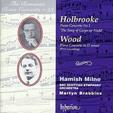 Once
again, no masterpieces here but very enjoyable music, very well performed
and recorded and with Hyperion’s usual high level of presentation,
including the poem which inspired the Holbrooke concerto. If the inclusion
of that work in the Romantic Piano Concertos series makes you expect
a warhorse, you’ll be disappointed, though the more dramatic Haydn
Wood concerto has moments more like what you were expecting – quite
different from the light music that we associate with his name.
Once
again, no masterpieces here but very enjoyable music, very well performed
and recorded and with Hyperion’s usual high level of presentation,
including the poem which inspired the Holbrooke concerto. If the inclusion
of that work in the Romantic Piano Concertos series makes you expect
a warhorse, you’ll be disappointed, though the more dramatic Haydn
Wood concerto has moments more like what you were expecting – quite
different from the light music that we associate with his name.
If you’re looking for the more familiar light Haydn Wood, try complete
albums of his music on Marco Polo 8.223402 from the Slovak Radio
SO/Adrian Leaper and 8.223605, the same orchestra with Ernest
Tomlinson – the CDs are deleted, possibly to return on Naxos less
expensively, but available to download from classicsonline.com (mp3)
or to stream from Naxos Music Library: see August 2009 DL
Roundup for both.
Ottorino RESPIGHI (1879-1936)
Vetrate di chiesa (Church Windows, P150)* [26:46]
Metamorphoseon modi XII, theme & variations for orchestra,
P169* [25:37]
Feste Romane (Roman Festivals)** [24:24]
Fontane di Roma (Fountains of Rome)** [16:40]
Pini di Roma (Pines of Rome)** [21:48]
Belkis, Queen of Sheba: orchestral suite* [22:31]
Impressioni brasiliane (Brazilian impressions)* [18:46]
Philharmonia Orchestra/*Geoffrey Simon; **Yan Pascal Tortelier –
rec. 1984, 1985 and 1991. DDD.
Pdf booklet available
CHANDOS CHAN241-45 [2-for-1: 77:12 + 80:14] – from theclassicalshop.net
(mp3 and lossless)
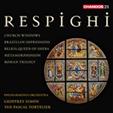 This
is a self-recommending reissue in two-for-one format of recordings which
were top recommendations – sometimes the only versions – at
full price. The music is unfailingly colourful – in places Technicolor-full
– and the performances do it justice, while the recordings, albeit
only 16-bit, still sound very well. The Chandos recording of Gli
Uccelli (The Birds) and Botticelli Pictures (CHAN8913)
is now deleted on CD; though the download remains available, which suggests
that an inexpensive reissue of that is also planned.
This
is a self-recommending reissue in two-for-one format of recordings which
were top recommendations – sometimes the only versions – at
full price. The music is unfailingly colourful – in places Technicolor-full
– and the performances do it justice, while the recordings, albeit
only 16-bit, still sound very well. The Chandos recording of Gli
Uccelli (The Birds) and Botticelli Pictures (CHAN8913)
is now deleted on CD; though the download remains available, which suggests
that an inexpensive reissue of that is also planned.
Bohuslav MARTINŮ (1890-1959)
Early Orchestral Works – Volume One (first recordings)
Prélude en form de scherzo, H181a (1929, orch. 1930) [1:30]
Orchestral movement, H90 (1913-14) [8:31]
Posvícení, H2 (1907) [6:18]
Nocturna I, H91 (1914-15) [8:28]
Little Dance Suite, H123 (1919) [42:50]
Sinfonia Varsovia/Ian Hobson – rec. 19-21 December 2012. DDD.
Pdf booklet available
TOCCATA CLASSICS TOCC0156 [68:20] – from toccataclassics.com
(mp3 and lossless) or stream from Naxos Music Library
[‘Once hooked and interested in exploring further, this series
of early orchestral works looks like becoming an indispensable part
of the Martinů discography, and I applaud its arrival wholeheartedly.’
See review
by Dominy Clements.]
This is not the place to begin to explore the music of Martinů,
but it’s an excellent recording for those who already know some
of his better-known works. The music is mostly much more placid than
you may expect, remarkably like the English pastoral school at times,
and the performances very good – there’s no benchmark, of
course, against which to compare them. The recording sounds fine in
lossless flac – just a little more expensive than the mp3. Had
the Freitas de Branco below not been my Discovery of the Month, this
might well have been it.
Discovery of the Month
 Luís
de FREITAS BRANCO (1890-1955) Orchestral Works: 4
Luís
de FREITAS BRANCO (1890-1955) Orchestral Works: 4
Symphony No. 4 (1944-52) [42:20]
Vathek – Symphonic Poem in the form of variations on an
Oriental Theme (1913) [34:03]
RTÉ National Symphony Orchestra/Álvaro Cassuto –
rec. April 2010. DDD
Pdf booklet included
NAXOS 8.572624 [76:23] – from classicsonline.com
(mp3) or stream from Naxos Music Library
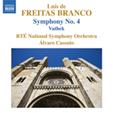 The
blurb on the back cover describes Portuguese composer’s Luís
de Freitas Branco’s fourth and final symphony as an appealing masterpiece;
I’m not so sure about the noun but the adjective will do well enough
– all the music here is very attractive and colourful and, in Vathek,
often exotic. Though Naxos have recorded a good deal of other music
by Freitas Branco, I hadn’t come across him before, only his brother
Pedro the distinguished conductor of the music of Falla, so this constitutes
a pleasant discovery.
The
blurb on the back cover describes Portuguese composer’s Luís
de Freitas Branco’s fourth and final symphony as an appealing masterpiece;
I’m not so sure about the noun but the adjective will do well enough
– all the music here is very attractive and colourful and, in Vathek,
often exotic. Though Naxos have recorded a good deal of other music
by Freitas Branco, I hadn’t come across him before, only his brother
Pedro the distinguished conductor of the music of Falla, so this constitutes
a pleasant discovery.
Gary Higginson, reviewing the previous volume in November 2010, and
noting that the Fourth Symphony was already in the can, confidently
expected that Volume 4 would follow very soon, but we’ve had to
wait over two years for it. More to the point he thought the RTÉ
Orchestra and Álvaro Cassuto persuasive advocates for the music,
and I find myself in complete agreement with that verdict.
Most recent Naxos releases from classicsonline.com come with lossless
flac available for £1 or $1 extra; this is available in mp3 only
but it sounds fine.
Ernest John MOERAN (1894-1950)
Cello Concerto (1945) [28:44]
Serenade in G (original version, 1948) [23:18]
Lonely Waters (c.1931) [8:01]
Whythorne’s Shadow (1931) [5:01]
Guy Johnston (cello)
Rebekah Coffey (soprano)
Ulster Orchestra/JoAnn Falletta – rec. February 2012. DDD
Pdf booklet included
NAXOS 8.573034 [65:18] – from classicsonline.com
(mp3 and lossless) or stream from Baxos Music Library
[‘Not to be missed by the serious Moeran enthusiast. Rewarding
music-making by performers who have re-imagined the concerto.’
See review
by Rob Barnett.]
E.J MOERAN – A Concert
Violin Concerto [32:26]
Fantasy Quartet [12:25]
Serenade in G (original version, 1948) [24:52]
Albert Sammons (violin);
BBC Symphony Orchestra/Sir Adrian Boult
London Symphony Orchestra/Basil Cameron
Leon Goossens (oboe); Carter String Trio – rec. 1946-48. ADD/mono
SYMPOSIUM SYMP1201 [72:36] – from eclassical.com
(mp3 and lossless)
[‘We should be eternally grateful for the foresight that made these
recordings in the first place and the goodness and wisdom of those who
permitted their issue and who handled the technical side with such care.’
See 4-star review
by Rob Barnett.]
Comparative recordings (Cello Concerto)
• LYRITA SRCD.299: Piers Coetmore (cello); LPO/Sir Adrian
Boult (with Cello Sonata) – review,
review,
review
and June 2012/1 DL
Roundup
• CHANDOS CHAN10168X (mid price) Raphael Wallfisch (cello);
Bournemouth Sinfonietta/Norman del Mar (with Violin Concerto, Lonely
Waters, Whythorne’s Shadow) – review
and February 2009 DL
Roundup. Both the above reviewed in June 2012/1 DL
Roundup.
(Serenade – original version)
• CHANDOS CHAN10235X: Ulster Orchestra/Vernon Handley (with
In the Mountain Country, Rhapsody No.1 and No.3, Nocturne) – review.
Download from theclassicalshop.net
(mp3 and lossless).
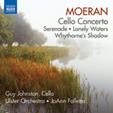 Rob
Barnett, who admits to having found the Cello Concerto rather diffuse
in earlier performances, preferred the new recording as making more
sense of the music for him. Certainly the Lyrita is not without technical
flaws in the performance of the solo part, but it remains vitally important
as embodying the thoughts of the work’s dedicatee, the composer’s
widow, and the Chandos offers excellent value for money. Without wishing
to displace either of those from my collection, I’m very happy
to endorse RB’s high regard for the new recording and to record
the fact that it sounds very well in download form, too.
Rob
Barnett, who admits to having found the Cello Concerto rather diffuse
in earlier performances, preferred the new recording as making more
sense of the music for him. Certainly the Lyrita is not without technical
flaws in the performance of the solo part, but it remains vitally important
as embodying the thoughts of the work’s dedicatee, the composer’s
widow, and the Chandos offers excellent value for money. Without wishing
to displace either of those from my collection, I’m very happy
to endorse RB’s high regard for the new recording and to record
the fact that it sounds very well in download form, too.
If you have access to the Naxos Music Library, you can compare the Naxos
and Chandos versions there before buying. Otherwise choice of coupling
should be a safe guide. (I originally mis-typed sage guide –
well, that too.)
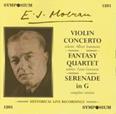 An
article in Gramophone in 1947 expressed the hope that the as
yet unrecorded Moeran Violin Concerto might not suffer the fate of the
Walton Violin Concerto, which had been allowed to ‘stray into a
foreign recording studio, with dire results’. The word was that
Albert Sammons might be persuaded to come out of retirement to record
the work with Sir John Barbirolli. Correspondents in 1949 were still
pleading for a Sammons version, unaware that he had recorded the work
at a public concert in April 1946, not with Barbirolli but with Sir
Adrian Boult.
An
article in Gramophone in 1947 expressed the hope that the as
yet unrecorded Moeran Violin Concerto might not suffer the fate of the
Walton Violin Concerto, which had been allowed to ‘stray into a
foreign recording studio, with dire results’. The word was that
Albert Sammons might be persuaded to come out of retirement to record
the work with Sir John Barbirolli. Correspondents in 1949 were still
pleading for a Sammons version, unaware that he had recorded the work
at a public concert in April 1946, not with Barbirolli but with Sir
Adrian Boult.
The recording has been left as is, with initial tuning noises, some
audience disturbance and a fair degree of surface crackle or radio interference
– the retention of the latter means that the sound is reasonably
full-bodied for its vintage. With equally authoritative performances
of the other works – and the Third Programme announcements in the
BBC English of the time – it’s well worth putting up with
the shortcomings of the recording.
Erich Wolfgang KORNGOLD (1897-1957)
Much Ado about Nothing (Incidental Music – first complete
recording) (1920)
University of North Carolina School of the Arts
Drama Soloists: Jackie Robinson – Beatrice; Ari Itkin – Benedict;
Daniel Emond – Claudio; Jessica Richards – Hero; Romolo Wilkinson
– Leonato; Christian Daly – Don Pedro; Drew Bolander –
Balthasar; Chesley Polk – Antonio; Nik Danger-James – Don
Juan
University of North Carolina School of the Arts Symphony Orchestra/John
Mauceri – rec. March 2012.
Pdf booklet available.
TOCCATA CLASSICS TOCC0160 [69:05] – from toccataclassics.com
(mp3 and lossless) or stream from Naxos Music Library
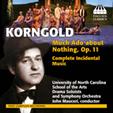
We’ve had the suite before but this is the first recording of the
complete score, with brief speeches but without connected dialogue and
it’s very welcome, especially as the music is less open to the
usual gibe about less corn than gold than is the film music or the violin
concerto. Ian Lace, who made it Recording of the Month
categorised it as a delight for committed Korngold fans, but I think
it will appeal to a wider audience, too.
William WALTON (1902-1983) Piano Quartet in d minor (1919) [28:49]
Frank BRIDGE (1879-1941) Phantasy in f minor (1910) [12:24]
Guillaume LEKEU (1870-1894) Piano Quartet (1893) [23:25]
Frith Piano Quartet (Benjamin Frith (piano); Robert Heard (violin):
Louise Williams (viola): Richard Jenkinson (cello)) – rec. October
2010. DDD.
Pdf booklet included.
NIMBUS ALLIANCE NI6183 [65:38] – from classicsonline.com
(mp3) or stream from Naxos Music Library
[see reviews by Paul Corfield Godfrey – here
– and Jonathan Woolf – here.]
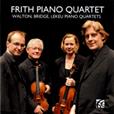 In
reviewing a new Nimbus Alliance release coupling the Bridge and Walton
piano quartets with Bax’s one-movement quartet and a new work by
Ian Wilson (b.1964), Noct for piano quartet – here
– I was surprised to find Nimbus duplicating their own good work
of a year ago. At the time of writing the new release was not yet available
for download. You may wish to wait, since I’ve recommended it with
very minor reservations and you may prefer the Bax coupling to the Lekeu
work included on this earlier recording, but if you’re happy to
try the Lekeu – listen, perhaps, via Naxos Music Library first
– you should be happy with the Frith Quartet.
In
reviewing a new Nimbus Alliance release coupling the Bridge and Walton
piano quartets with Bax’s one-movement quartet and a new work by
Ian Wilson (b.1964), Noct for piano quartet – here
– I was surprised to find Nimbus duplicating their own good work
of a year ago. At the time of writing the new release was not yet available
for download. You may wish to wait, since I’ve recommended it with
very minor reservations and you may prefer the Bax coupling to the Lekeu
work included on this earlier recording, but if you’re happy to
try the Lekeu – listen, perhaps, via Naxos Music Library first
– you should be happy with the Frith Quartet.
I enjoyed hearing the unfinished Lekeu Piano Quartet, completed by d’Indy,
but there are other recordings, including three available from Naxos
Music Library on the Ricercar, Atma and Virgin Classics labels. The
Ricercar and Atma recordings couple the work with other chamber music
by Lekeu; the budget-price 2-CD Virgin recording (without the d’Indy
completion of the second movement) comes with works by Chausson, Saint-Saëns
and Castillon – review:
download for £4.99 from sainsburysentertainment.co.uk
(mp3).
Alternatively, my benchmark for the Bridge is the recording from the
Dartington Piano Trio with Patrick Ireland (viola) on a budget Hyperion
Helios recording (CDH55063, with the Phantasie Trio and Trio
No.2), recommended by Rob Barnett – here
– and included with other recordings of Bridge in what I described
as a treasure trove of English chamber music in my 2013/4 Download
News.
I had expected to find the Walton Piano Quartet better provided for
in the catalogue than the six recordings which seem currently to be
generally available. Jonathan Woolf and Paul Corfield Godfrey both liked
the Frith Quartet performance, though both had reservations about whether
potential buyers would want the Lekeu coupling. Certainly the Bax single-movement
quartet makes a more logical partner, unless you followed Rob Barnett’s
advice and bought the Meridian recording of that work – see above.
There are also front runners from the Maggini Quartet and Peter Donohoe,
with the String Quartet (1947) – keen value on Naxos 8.554646
at budget price – and the Nash Ensemble, with other Walton works,
on Hyperion CDA67340. Comparing these in my May 2012/1 Download
Roundup, I wrote that both these competing recordings of the Piano
Quartet are excellent, both come with informative booklets and both
are offered in good mp3, but the Hyperion coupling is more varied and
more generously coupled – especially attractive if you already
have a version of the String Quartet – and Hyperion’s lossless
sound can be yours for the same price as the mp3. These remain obvious
choices for anyone seeking an all-Walton programme.
The two Nimbus recordings yield little to the opposition – either
can be recommended, depending on your preferred coupling. If you are
looking for the Bax there appears to be only one current rival recording
to the new Nimbus recording, more adventurously coupled with music by
Dunhill, Hurlstone and Quilter (as reviewed above, Meridian CDE84519:
Recording of the Month – review).
You may find that recording hard to come by, but it’s available
as a CD or download from amazon.co.uk – here
– and it can be downloaded for £4.20 or less from emusic.com
– here.
It’s also available for streaming from Spotify.
Dmitri SHOSTAKOVICH (1906-1975)
Symphony No. 7 in C, Op.60, Leningrad (1941)
Royal Liverpool Philharmonic Orchestra/Vasily Petrenko – rec. 1-3
June, 2012. DDD
Pdf booklet included
NAXOS 8.573057 [79:15] – from classicsonline.com
(mp3 and lossless)
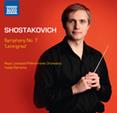 John
Quinn compared this, the eighth and latest in the RLPO/Petrenko Shostakovich
cycle, with another recent offering from Andris Nelsons on Orfeo and
the 1988 Chicago SO/Bernstein DG recording – review.
Like JQ, I thought Petrenko slow to get off the mark but when the relentless
march builds up to a climax the blood begins to course in such a way
as to override any objections.
John
Quinn compared this, the eighth and latest in the RLPO/Petrenko Shostakovich
cycle, with another recent offering from Andris Nelsons on Orfeo and
the 1988 Chicago SO/Bernstein DG recording – review.
Like JQ, I thought Petrenko slow to get off the mark but when the relentless
march builds up to a climax the blood begins to course in such a way
as to override any objections.
One reviewer (not MusicWeb International) has given this an ‘outstanding’
rating. I wouldn’t go that far, but I enjoyed it overall; it’s
far better than Naxos’s earlier version from Ladislav Slovak and
the recording is good. I listened to both the mp3 and lossless (flac)
versions; the mp3 sounds fine but the lossless is worth the expenditure
of an extra pound or dollar. The logic of classicsonline.com’s
policy of lumping all the tracks together for their lossless downloads
continues to elude me, however; I can see why they might offer mp3 this
way, to avoid gaps between tracks when played from an mp3 player –
except that they don’t do it with mp3, only with flac.
It’s a shame that DG chose to yoke the Bernstein with the First
Symphony for its reissue on their Grand Prix label, but you’ll
find it for £7.49 in 320kb/s mp3 from 7digital.com.
You’ll find lossless flac download from the DG website, but currently
at a price higher than you’ll find by clicking the MDT purchase
button from JQ’s review.
Ferde GROFÉ (1892-1972) Hudson River Suite [18:11]
(King) Norodom SIHANOUK (1922-2012) Cambodian Suite [6:43]
Manuel de FALLA (1876-1946) La vida breve, Act II: Danza
[3:05]
Paul WHITE Five Miniatures: No. 5. Mosquito Dance (version for
orchestra) [1:00]
Terig TUCCI (1897-1973) La bamba de Vera Cruz [2:19]
Hershy KAY (1919-1981) Western Symphony: Saturday Night [5:23]
André Kostelanetz and his Orchestra – rec. 1955. ADD.
NAXOS CLASSICAL ARCHIVES 9.81034 [36:11] – from classicsonline.com
(mp3)
[Not available in the USA, Australia, Singapore and certain other countries.]
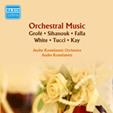 There
are several interesting rarities here. To the best of my knowledge there’s
only one recent recording of the Hudson River Suite, from the
Bournemouth SO/William Stromberg on another Naxos album (8.559017
– see review
(5 stars) and review).
If you enjoy his Grand Canyon Suite and On the Trail,
you should like this, too.
There
are several interesting rarities here. To the best of my knowledge there’s
only one recent recording of the Hudson River Suite, from the
Bournemouth SO/William Stromberg on another Naxos album (8.559017
– see review
(5 stars) and review).
If you enjoy his Grand Canyon Suite and On the Trail,
you should like this, too.
Hersky Kay is better known as an arranger of the music of Gershwin and
others, so the excerpt from his Western Symphony was a discovery
– a discovery eclipsed, however, by the inclusion of King Sihanouk’s
three-movement Cambodian Suite. I’d been completely unaware
that the man who ruled Cambodia had been a composer. The music makes
few gestures, however, towards SE Asia; if you didn’t know, you
might well think it had been composed by the likes of Ferde Grofé,
perhaps partly because of the way that Kostelanetz plays it.
The recording is very good for its age. Though the playing time is short,
it’s well worth £1.99 to explore this album. You may well
find that the tracks play in the wrong order unless you add a 0 before
1. to 9. (Back up the music first and do it very carefully).
Discovery of the Month
 Mario
LAVISTA (b.1943) Complete String Quartets (First complete recording)
Mario
LAVISTA (b.1943) Complete String Quartets (First complete recording)
String Quartet no.2, Reflejos de la Noche (1984) [10:30]
String Quartet no.3, Música para mi Vecino (1995) [12:25]
String Quartet no.4, Sinfonías (1996) [16:26]
String Quartet no.5, (Seven Inventions) (1998) [11:07]
String Quartet no.1, Diacronía (1969) [7:55]
String Quartet no.6 (Suite in five parts) (1999) [13:49]
Cuarteto Latinoamericano – rec. February 2007. DDD
Pdf booklet available.
TOCCATA CLASSICS TOCC0106 [72:12] – from toccataclassics.com
or theclassicalshop.net
(mp3 and lossless) or stream from Naxos Music Library
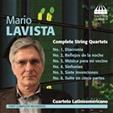 If
I mention the influence of Stockhausen and 1960s experimental music,
many of you who share my tastes in music will probably shy away, but
I’m more than willing to make an exception for the music of Mario
Lavista. Experimental much of it may be – and decidedly tough in
the case of the First Quartet, sensibly not offered as the first work
here, presumably to avoid giving the wrong initial impression –
but I found it fascinating and often hypnotic. The performances are
presumably authoritative and the recording in lossless form is excellent.
Byzantion recommended the music as an essential for any music-lover
– review
– and Mark Sealey was also appreciative – review
– to which I’m pleased to add a belated third recommendation.
If
I mention the influence of Stockhausen and 1960s experimental music,
many of you who share my tastes in music will probably shy away, but
I’m more than willing to make an exception for the music of Mario
Lavista. Experimental much of it may be – and decidedly tough in
the case of the First Quartet, sensibly not offered as the first work
here, presumably to avoid giving the wrong initial impression –
but I found it fascinating and often hypnotic. The performances are
presumably authoritative and the recording in lossless form is excellent.
Byzantion recommended the music as an essential for any music-lover
– review
– and Mark Sealey was also appreciative – review
– to which I’m pleased to add a belated third recommendation.
A Night at the Opera
Giuseppe VERDI (1813-1901) arr. Giuseppe MARTUCCI Concert
Fantasy on La Forza del Destino, Op.1* [8:53]
Vincenzo BELLINI (1801-1835) arr. Sigismund THALBERG A
te, O cara, Op.70/1 [5:40]
Vincenzo BELLINI arr. Andrew WRIGHT Fantasy on La Sonnambula,
Op.3 [8:00]
Richard WAGNER (1813-1883) arr. Franz LISZT Recitative
and Romance O, du mein holder Abendstern from Tannhäuser,
S444 [7:42]
Richard WAGNER arr. Franz LISZT Isolde’s Liebestod,
S447 [7:48]
Andrew WRIGHT Thalbergiana, Op.1 [6:25]
Giuseppe VERDI arr. Sigismund THALBERG Concert Fantasy
on La Traviata, Op.78 [8:26]
Vincenzo BELLINI arr. Sigismund THALBERG Casta diva,
Op.70/19 [6:25]
Giacomo MEYERBEER (1791-1864) arr. Andrew WRIGHT Concert
Fantasy on Robert le Diable [5:23]
Andrew Wright (piano) – rec. Reid Hall, Edinburgh, 5-6 September
2012.
* first commercial recording
From amazon.co.uk
(mp3) or cdbaby.com
(CD, mp3 or flac, with sleeve notes).
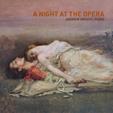 Though
these transcriptions were intended by their arrangers for bravura
public performance and for domestic consumption in an age before musical
reproduction was available, there’s still a place for them even
now when the vocal originals are so easily available on demand when
they’re as well performed as they are here.
Though
these transcriptions were intended by their arrangers for bravura
public performance and for domestic consumption in an age before musical
reproduction was available, there’s still a place for them even
now when the vocal originals are so easily available on demand when
they’re as well performed as they are here.
The essence of the transcriptions is for the likes of Liszt to show
off their technique and there’s oodles of that on display here,
but without neglecting the music’s emotional content. The only
exception that I thought at first I was going to make concerns the Liebestod
– initially it seemed a trifle understated, but that makes the
emotional fireworks all he more effective when they explode. Though
I’m not a great fan of Maria Callas, I missed her voice in Casta
Diva, but this is as good as it gets in piano transcription.
One listener at Amazon has already given this a rave 5-star review and
I see no reason to demur. If you’re happy to pay in dollars, however,
CD Baby offers the better deal – their price of $8.49 is slightly
less than amazon.co.uk’s £7.49 and though they don’t
offer the pdf booklet which I received for review, they do include all
the sleeve-notes on their web-page and they offer 320kb/s mp3, as received
by me for review, rather than Amazon’s usual 256kb/s, and even
lossless flac. The recording sounds fine, if a trifle close and Andrew
Wright’s notes cast light on an area of the repertoire with which
I was all too unfamiliar.
There’s an increasing tendency for artists to publish their own
recordings without benefit of a label. If they were all as good as this,
we wouldn’t need the record companies.
For another experience of the same kind, try the first volume of the
projected Toccata Classics planned series of Wagner arranged for the
piano by August Stradal and performed by Juan Guillermo Vizcarra (TOCC0151
– download in mp3 or flac from toccataclassics.com:
see review
by Nick Barnard).
Geoffrey Molyneux has also listened to A Night at the
Opera:
This fascinating disc brings together some well-known pieces as well
as several transcriptions with which I was previously unfamiliar. The
late nineteenth century composer Giuseppe Martucci wrote mostly orchestral
and instrumental music and no operas which was unusual for Italian composers
of the time. I found his Concert Fantasy on La Forza del Destino
very convincing, especially as this is an early work by this composer.
It provides plenty of opportunities for virtuosic display by the performer.
Andrew Wright plays with a really glittering tone in the brilliant right
hand accompanying passage-work and he also shows a good grasp of the
music's episodic structure. I particularly enjoyed the first of the
two Thalberg transcriptions, A te, o cara from I Puritani.
This piece contains much expressive and decorative music, attractively
played here by Andrew Wright who always allows the melody to sing through
the texture however complex.
Liszt's transcriptions of Wagner are of course very well-known, and
Wright is particularly successful with a through-composed work such
as Isolde's Liebestod. There is more drama here than in those
pieces which consist basically of a succession of largely unconnected
themes, often associated with Italian opera of this period. However
he adopts a rather slow tempo for the main theme of the Liebestod
which is fine for a singer who has a better possibility to sustain the
tone, something rather more difficult to achieve on a piano. However
there is a real sense of drama here. Wagner, Liszt and Wright together
achieve a massive climax at the music's climactic point, and Isolde's
Liebestod is the highlight of the disc for me. Probably this
is because the work is created from one of the greatest pieces of music
of the late nineteenth century!
I felt that Wright was really at his best when performing his own arrangements.
I really enjoyed his fabulous and rich sounding piano in Thalbergiana,
with its judicious mix of romantic melody and pianistic acrobatics.
We hear beautifully expressive playing, excitement and drama in his
version of Bellini's La Sonnambula, and Wright concludes his
performance with a fine flourish of powerful virtuosity. Similarly virtuosic
and entertaining is Wright's Concert Fantasy on Meyerbeer's Robert
le Diable, and this makes for a superb climax to a fine and interesting
disc.
The entire programme is superbly and thrillingly played and the music
is full of interest, including some unusual repertoire. The excellent
recording copes magnificently with the vast range of tone colour and
dynamics demanded by the pianist. This is a disc well worth hearing.
Highly recommended.
Geoffrey Molyneux











